
THROUGH THICK & THIN BLUE LINE TOM
SHANKS


Editor
Steven Hugill steven@netimesmagazine.co.uk
Business journalist
Colin Young
T: 07808 974 533 colin@netimesmagazine.co.uk
Business development director


John Duns
T: 07920 152 523 john@netimesmagazine.co.uk
Creative and managing director
Peter Mallon
T: 07590 064 800 pete@netimesmagazine.co.uk
Partnership & marketing manager









Chloe Holmes
T: 07493 555 509 chloe@netimesmagazine.co.uk
Accounts Jill Brown jill@netimesmagazine.co.uk
Filmography
Andrew Lowe andrew@netimesmagazine.co.uk
Contributors: Darren Henley Tees Valley Mayor Ben Houchen Sarah Ledger
Photography: Christopher Owens www.christopherjamesowens.co.uk Angela Carrington www.thisisthebiggerpicture.co.uk
Head office 0.09 PROTO, Baltic Business Quarter, Abbot's Hill, Gateshead, Tyne and Wear, NE8 3DF
All rights reserved. Reproduction, in whole or in part without written permission, is strictly prohibited.
Circulation:
To confirm our circulation please contact Andrew Dunn, Stephens and George Print Group, email: andrew.dunn@stephensandgeorge.co.uk
To amend your mailing address or remove yourself from our mailing list contact chloe@netimesmagazine.co.uk
Contact: @NETimesmagazine enquiries@netimesmagazine.co.uk www.netimesmagazine.co.uk
Photography:
All photos taken by North East Times staff are copyright North East Times Magazine Ltd, and are taken solely for use in North East Times Magazine or products published by North East Times Magazine Ltd.
If you wish to use or publish a photograph taken for North East Times, please contact pete@netimesmagazine.co.uk

Advertising charges:
There is a £25 charge for every set of amendments, following the first initial set of amendments, which is free of charge for adverts designed by North East Times Magazine Ltd.
Cancellations: If an advert is cancelled by the booker within a seven day period prior to our print deadline, the advert will be charged in full, plus VAT.
Editorial:
Editorial must be received by the 9th of the month or no responsibility is accepted for errors. The opinions expressed in this issue are not necessarily the views held by North East Times Magazine Ltd.
Strategic partners
Partners
Advertisements:
Although every care is taken to ensure accuracy, the publishers regret that they cannot accept responsibility for loss or damage caused by an error in the printing or damage to, loss of artwork, transparencies or photos.
Complaints: Regarding advertisements will only be considered for up to a week after publication. Advertising must be received by the 12th of the month. No responsibility is accepted for errors.
Print:
North East Times is printed by Stephens & George Limited, a fourth-generation, award-winning printer based in Merthyr Tydfil, South Wales, which is a specialist in sheet-fed lithographic printing of magazines, brochures and programmes.
North East Times is produced using vegetablebased inks combined with innovative chemical-free plate and Heidelberg press technology.
All papers are sourced from well-managed, sustainable forests and Stephens & George’s vast supply chain holds many environmental accreditations.
In addition to this, they hold a Climate Change Agreement along with ISO14001, ISO9001, FSC, PEFC and offer Carbon Balancing via The World Land Trust.

They achieved an E2B Silver award for energy improvements along with an E2B Gold award for recycling; 98.5 per cent of all their waste is recycled.

www.stephensandgeorge.co.uk
@2023
4
Credits
Published by North East Times Magazine Ltd.


editor’s WORD
4Hello and welcome to the latest edition of North East Times Magazine - and indeed to a new year. How are those resolutions holding up…?
Given the tumultuous nature of 2022 - and the tribulations of 2020 and 2021 - I’d understand if many of you have chosen to sit tight on any long-term changes until the political and economic clouds show some signs of breaking.
But I appreciate too that there will be an equal number of you pressing ahead with plans and practises.
And this edition channels that latter spirit, from business ventures promising marketplace transformation and political fresh starts, to adding more timbre to the region’s voice to strengthen its reputation both nationally and globally.
It is led by cover star Tom Shanks, who, as part of the Blueline dynasty, is helping drive the well-known family taxi firm into a new technological future, all while leading further efforts to make the sector greener.
Under the literal guidance of PhD student Tom, North East Times Magazine tours the company’s back story - and Newcastle’s streets - to trace its journey from a one-vehicle taxi business founded by a former prisoner of war to an organisation that touches the lives of hundreds of thousands of people every week.
We also spotlight Rosie Bath, who has used the springboard of an entrepreneurial award as a catalyst for concerted environmental change.
Leaving London - and a Hollywood costume
designer role - behind, Rosie last year returned to the North East to officially launch Cera Cotton.
And the venture, which creates household items such as peg bags and toothbrush travel pouches from wax cotton, is attracting ever-increasing attention as consumers seek to improve their sustainable credentials.
We feature too County Durham-born Dr Fiona Hill, who swapped the area’s mining landscape for a life that took her to the coal face of international politics.
As Donald Trump’s top Russia advisor - which included meetings with Vladimir Putin - Fiona bore witness to an extraordinary period in diplomatic history, which ended when she testified against the tycoon-turned-politician during his first impeachment trial.
Hers is a story of new identity, of seeking to create futures fashioned out of the past, of present-day political populism and its links to her childhood.
Elsewhere, we focus on the North East’s future within the Government’s ‘levelling-up’ agenda.
Assessing the progress of Westminster’s flagship equalising strategy through the eyes and minds of regional business leaders in a roundtable setting, we look at where success has been achieved and where work remains outstanding if the Government is true in its resolution to close the commercial, economic and social divide between London and the rest of the UK.
I hope you enjoy this issue.
Steven
7
The new year may have begun with some old uncertainties but, as Steven Hugill highlights, there nevertheless remains much resolution across the region to deliver positive change…
WELCOME TO ISSUE 456
p. 014-015
p. 022-023 p. 038-044
It wasn’t just collectors of football World Cup album stickers that ended last year poring over the gaps in teams’ line-upsthe two principal political parties were doing the same thing after a number of Conservative and Labour ministers announced their intention to step down at the next general election.
Words by Steven Hugill
Just how important are apprentices to organisations’ futures? And are there any elements of the learning system you believe could be improved?


Words by Steven Hugill
One of the North East's best-known taxi companies celebrated its 60th anniversary before the pandemic. And like so many businesses, Wallsend-based Blueline had to adapt to the unique challenges caused by COVID-19.

Words by Colin Young
Got. Got. Need...
The Big Question
Through Thick & Thin Blue Line
8
Contents
JOIN OUR TEAM
p. 066-071 p. 084-087 p. 90
A new product set to revolutionise our reliance on plastic is being quietly developed in a small house garage in a remote County Durham village. Rosie Bath only started experimenting and creating household items using wax cottonwhich has been around for more than 500 yearsin 2021.
Words by Colin Young
Waxing lyrical
Words by Steven Hugill Dr Fiona Hill went from the coalfields of County Durham to the corridors of US power. A miner’s daughter turned renowned Russia expert, she acted as a top security advisor to presidents Donald Trump, Barack Obama and George W Bush.



Words by Steven Hugill
Closing this month’s issue of North East Times Magazine, Sarah Ledger, chief executive at Middlesbrough-based Lexonik, reflects on the education firm’s recent National Literacy Trust acclaim, assesses the post-pandemic learning landscape and sets out why strong reading skills are fundamental to the North East fulfilling its ‘levelling-up’ ambitions.
9
A new kind of identity The Last Word Contents
Business spotlight
A company behind 3000-job electric vehicle battery factory plans says it is “continuing to actively work on several potential scenarios” to secure its future.
Britishvolt says it remains committed to building “a strong and viable business” after a £30 million Government cash delay reportedly left it facing administration.
The company’s proposed plant, set for Cambois, near Blyth, Northumberland, is earmarked to create 3000 direct jobs and support another 5000 supply chain posts by making hundreds of thousands of vehicle power packs every year.

However, its future was thrown into doubt late last year when a request for a £30 million Government advance – as part of a wider £100 million Downing Street-led Automotive Transformation Fund deal – was refused.
The company subsequently agreed an 11th hour investor deal to continue operations in the “near-term”, which it said would provide “a bridge to a more secure funding position for the future”.
And bosses – who previously cited “challenging external factors” and the “weakening economic situation” as key drivers in its difficulties – have now said they will reveal “more about our planned future direction early in the new year”.
The update came as part of a rebuttal of a national newspaper’s claim Britishvolt had tapped into the Automotive Transformation Fund to aid its progress.
A spokesperson said: “While the Government announced in January its support for the business, which was then further confirmed in July, the company has not yet drawn down any of the grant funding from the Automotive Transformation Fund.
“No British public money has been accessed via the fund, to date.
“Britishvolt is continuing to actively work on several potential scenarios offering the longer-term sustainability needed to enable the company to build a strong and viable British battery cell research and development and manufacturing business.
“We will say more about our planned future direction at the appropriate time early in the new year.”
Meanwhile, a subsea power line maker has begun work on its
own Cambois plant.
JDR Cable Systems has turned the first sod on a 69,000sq metre factory it says will open in 2024 and expand the business’ product range in the rapidly-growing global renewable energy market.
The firm was previously backed by a Government Export Development Guarantee, from the Offshore Wind Manufacturing Investment Scheme, to deliver the plant.
Tomasz Nowak, JDR chief executive, said: “This is a significant moment for the North East, as projects like ours will provide more local jobs and opportunities for the people of Cambois, Bedlington and the surrounding area.”
Alongside its Northumberland expansion, JDR says it will spend £3 million on machinery at its longstanding Hartlepool base, which it says will boost production by nearly 25 per cent.
• Investors drive Altilium Metals' plans - see page 11
10
Business Spotlight_
North East Times Magazine throws a spotlight on the latest news, views, trends and technologies shaping the region’s economic and business landscape
Britishvolt ‘working on several scenarios’ to deliver 3000-job Northumberland factory Manufacturing
An artist’s impression of Britishvolt’s planned Cambois factory
Blueprint rolled out for £48 million hotel Regeneration
Ask:PATRIZIA says its planned Gateshead hotel will offer “quality hospitality where people can experience the wider region at its best
A regeneration joint venture has unveiled £48 million hotel plans.

Ask:PATRIZIA hopes to build a 344-bedroom, nine-storey base on land straddling Gateshead’s Quarryfield Road and Hawks Road.
It says the endeavour will create upwards of 75 full-time jobs and dozens of supply chain posts, adding it will accompany the wider redevelopment of Gateshead’s quayside, which will include a sprawling arena and conference complex bosses say will attract more than one million visitors a year.
A spokesperson said: “This will not only create new jobs and provide a boost for a great location, but also offer a quality hospitality location where people can stay and experience the wider region at its best.”
Alex Kennedy, senior planner at Lichfields’ Newcastle office, who is overseeing the planning application, added: “This is a great regeneration project that represents a significant contribution to the vitality and vibrancy of an important local economic sector.”
Kromek Group delight at multimillion-pound security contracts Manufacturing
A technology firm behind apparatus aimed at foiling terror plots has secured deals worth nearly £6.5 million.
Kromek Group is supplying “biological threat detection systems” to a Government department in a near £5 million, three-year deal.
The Sedgefield business is also working on two contracts - worth a combined £1.5 million - to send nuclear security products to “European government end-users”.
The NETPark-based firm is known for its wearable nuclear radiation detector kits, which are used by defence forces to identify ‘dirty bombs’.
Referring to its Government deal, Dr Arnab Basu, chief executive, said: “The
Investment ‘will accelerate’ battery plant development Development
A company behind plans for a huge Teesside electric vehicle battery recycling plant has secured fresh financial support.
Altilium Metals has raised £786,005 from more than 400 investors.
Bosses say the backing will significantly drive forward its blueprint for a “multimillion-pound” factory, which aims to annually turn battery waste from more than 150,000 electric vehicles into a key component for new power packs.
The plant, tipped to create as many as
pandemic has demonstrated the impact of biological incidents – whether it is through an act of terror or naturally emerging threats - and governments throughout the world are reviewing their strategies.
“We believe technologies that can provide information about emerging threats in near real time will be a critical component of such strategies.”
Dr Basu previously said the business - a Durham University spin-out - was looking to the future with “increased confidence” after it recorded stronger financial results.

According to latest figures, revenues increased 16 per cent on the previous year to £12.1 million, with pre-tax losses falling £200,000 to £6.1 million.
As well as the security sector, the business’ technology is also used in the medical environment to conduct bone analysis.
200 jobs, is expected to open in 2025, with a final decision on its Teesside location due early this year.
Dr Christian Marston, Altilium Metals co-founder, said: “The success of this campaign shows the interest from the retail investment community in a focused business supplying the critical metals needed for the energy transition.
“It speaks volumes in terms of optimism for our business model around supporting the supply of rare technology metals in a sustainable way.”
The business has already secured more than £3 million support from the Government, and intends to list on AIM within the next 18 months.
11
Business Spotlight_
Dr Arnab Basu, Kromek Group chief executive, inside the firm’s Sedgefield base
Seriös Group on growth trail after office switch Technology
A data analytics and testing consultancy is aiming to double its workforce after moving to new offices.
Seriös Group hopes to have nearly 80 staff by the end of the year following a switch to Newcastle’s Hoults Yard.
The business - which employs 42 staff and counts work with Sunderland AFC in its portfolio - says its new premises will help roll out a successful hybrid working model.
Paul Davison, operations director and co-founder, said: “We’ve seen quite spectacular growth, and earlier this year realised we needed more space.
“At the same time, we recognised a more hybrid way of working would be more appropriate.
“And we can’t wait to get into our new studio space; we wanted to make it easier for our teams to collaborate, and Hoults Yard had everything we were looking for.”
He added: “We have a talented team, but are still on the look-out for the right people, and are expecting our headcount to be close to 80 by the end of the year.”
Seriös Group recorded turnover of £1.42 million in its second year, and bosses say they expect the figure to double in 2022/2023.
Government commits cash for rail station revamp Transport
A town will gain “fast, reliable rail services” and its people will be connected to “new job opportunities” in a £105 million station overhaul, Chancellor Jeremy Hunt has said.
The Government has committed a fresh tranche of cash to redevelop Darlington’s main train hub.
Officials say the work will create a “transport interchange”, with new platforms - earmarked to improve national links via the East Coast Main Line, as well as access to local stations - complemented by a multi-storey car park.
Demolition of neighbouring business premises, to make way for the station’s extension, has already begun, with the scheme scheduled for completion by mid-2025.
Confirming a further £93 million funding for the project - through Downing Street’s Integrated Rail Plan - which takes its overall commitment to £105 million, the Chancellor said: “‘Levelling up’ the country remains a central priority, and our commitment to Darlington station's modernisation is a perfect example of that.”
The scheme has also received £33 million from Tees Valley Combined Authority and Tees Valley Mayor Ben Houchen, who said it marks another boost for Darlington, which will soon house well in excess of 1000 civil servants in a newly-created national economic campus.

He added: “This will help breathe new life into the station, and opens the door to better rail services across our region.”
The project is further supported by Darlington Borough Council, Network Rail and operator LNER.
Ribbon cut on construction training base Skills
A new-build warranty and insurance provider has opened a skills hub.
NHBC says its training base, set on a Newcastle property development, will “support the next generation of skilled housebuilders in the North East”.
It says more than 100 apprentices will receive tuition every year, with an initial focus on bricklaying.
The hub is a partnership between NHBC, housebuilder Keepmoat, New Tyne West Development Company, Newcastle City Council and North of Tyne Combined Authority.
Mesma to expand team after Core move Technology
A technology firm is creating jobs after moving to a larger office.
Mesma wants software and business development staff following a switch to The Core, in Newcastle.
The recruitment drive follows a period of substantial growth for the business, which supplies technology to colleges, universities and employment support providers to improve quality
assurance processes.
However, bosses say the company – which counts the Department for Education among its clients, and recently welcomed business development apprentice Evan Simons, software developer Liam Imray and graduate marketing intern Matthew LeJeune - has further scope to expand, with national and global plans in the pipeline. Sally Forsyth, marketing and business development manager, said: “This represents the next chapter for the business.”
12
Business Spotlight_
An artist’s impression of how Darlington’s main railway station - known locally as Bank Top - will look following its redevelopment
Willis’ £25 million airport plans set for take off Investment
Plans to create a £25 million aircraft maintenance and business flights hub have moved forward.
Willis Lease Finance Corporation – alongside wholly-owned subsidiary Willis Aviation Services Limited – has submitted a blueprint to build a base at Teesside International Airport.
Bosses say the development will create as many as 200 jobs.
According to the plans, the company – which already carries out maintenance, storage and disassembly work at the airport – will extend operations out of five hangars.
The proposals also promise an increase
in activity at the site’s Jet Centre, with Willis pledging to build on existing ground handling services for business, private aviation, military and cargo flights.
A decision on the plans is expected early this year.
Speaking about Willis’ expansion vision to North East Times Magazine last year, Phil Forster, the airport’s managing director, said: “There are so many opportunities for us on the commercial side.
“This airport sits in a freeport, has more than 800 acres of land to develop and a runway, which at 2291 metres long, can take any aircraft.
“And Willis has extended its agreement because it can see the opportunities and the levers for growth.”
In Brief
A selected round-up of stories from across the region
4Newcastle International Airport has hailed the return of “strong demand for international travel” after smashing the four million passenger mark in 2022. The milestone was reached on an Air France flight to Paris.
4Darlington-headquartered estate and lettings agency My Property Box is eyeing growth across Cumbria and West Yorkshire following £300,000 finance from the North East Growth Capital Fund.
Port operator lands German alliance Distribution
A Wearside-based fertiliser supplier has signed a German distribution partnership.
Brineflow is working with Hamburg’s HELM AG.
Bosses at Brineflow, which runs a terminal at Port of Sunderland, say the tie-up will “maintain security of supply at a time of international uncertainty”.
John Fuller, Brineflow chairman, said: “This brings together two family-owned companies, whose shareholders have traded with each other for nearly 40 years.”
Matthew Hunt, Port of Sunderland director, added: “Britain’s farmers have been hit incredibly hard by fertiliser shortages brought by COVID-19 and the war in Ukraine, and the deal between Brineflow and HELM AG will be crucial in securing the foundations of the entire food chain.
"We are incredibly proud to have Brineflow continuing to invest in the port."
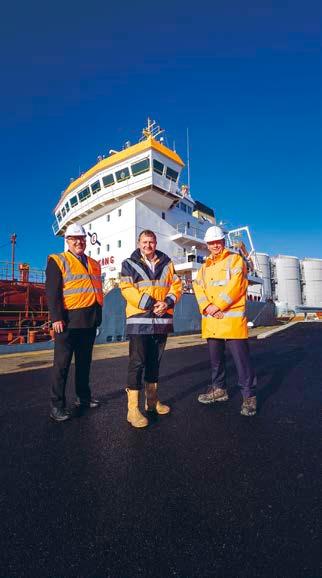
4A football price comparison website operator aims to expand into ticketing, gaming and media subscriptions with £400,000 support. FOOTY.COM has been backed by the North East Innovation Fund, which is supported by the European Regional Development Fund and managed by Northstar Ventures.
4Cramlington-based engineering firm Quanta EPC has praised the impact of its “high-quality approach” after securing multimillion-pound contracts to continue providing energy sector operations and maintenance support.
4The Thermal Insulation Contractors Association has received a ‘good’ Ofsted report. The national trade body, which trains levy-funded apprentices in Darlington, was praised for creating an environment where learners “develop and flourish”.
For more news and views across the North East, visit our website @ www.netimesmagazine.co.uk/news
13
Business Spotlight_
Pictured, from left to right, are Councillor Graeme Miller, leader of Sunderland City Council; John Fuller, Brineflow chairman; and Matthew Hunt, Port of Sunderland director
Got. Got. Need…
It wasn’t just collectors of football World Cup album stickers that ended last year poring over the gaps in teams’ line-ups - the two principal political parties were doing the same thing after a number of Conservative and Labour ministers announced their intention to step down at the next general election. Here, Steven Hugill looks at the important decisions each party needs to make when it comes to swapping personnel ahead of the big ballot.
Words by Steven Hugill
4Harry Kane? Need.
Ao Tanaka? Got.
Walker Zimmerman? Got. Three times.
Filip Duricic? Got that too. I swear they print certain versions more than others.
Daniel-Kofi Kyereh? I’m not even sure that one exists…
If, like my partner and I, you spent the last days and weeks of 2022 furiously endeavouring to fill a World Cup football sticker album for your children, then the refrains above will sound all too familiar.
To be fair, the process is much easier than it once was, the pristine riches of social media swap shops far better than the days of playground dealings, where traders offered duplicated - and (on occasion) questionably stained - stickers that curled from corner to corner under the force of an ageing elastic band.
Even with the internet’s wide-ranging support, however, it nevertheless remains a long old slog filling an album with nearly 700 stickers, and one evening, after perhaps rejoicing a little too much at receiving Uruguay’s Rodrigo Bentancur and Netherlands forward Cody Gakpo through the post, my mind began to wander.
The television was on in the background, a reporter revealing that after munching on animal genitalia in an Australian rainforest - all
in the name of promoting dyslexia awareness, rather than a fat cheque, apparently - ex-health secretary Matt Hancock was so chewed up by politics that he’d decided to stand down at the next general election.
And listening to his withdrawal, while flicking through my album pages - vacant, square spaces where players should be staring back - got me thinking.
Although apparently a big Southampton Football Club fan, I very much doubt Rishi Sunak keeps a Panini-style scrapbook of his respective ministers, complete with height, weight and favoured playing position…
Nonetheless, he’s got an increasing number of swaps to make come the next ballot, with Hancock joining a swathe of MPs in laying down their blue rosette.
The exodus includes short-lived Chancellor Sajid Javid, Crispin Blunt and Bishop Auckland’s Dehenna Davison, who was only appointed to a role on the Government’s ‘levelling-up’ agenda in September last year.
Her departure - just one term into a Westminster career that began with her emphatically wresting control of the County Durham constituency from Labour - is a particular blow for the Conservatives’ future ‘red wall’ hopes.
14
Opinion
Politics
Yet in a way, the departures may not be such a bad thing.
Given a fair chunk of the general public’s faith in the Government is now paper thin at best following a tumultuous 2022, revising the team sheet and tactics board is exactly what the Conservatives need.
And as a Saints follower, the Prime Minister knows all about how rebuilding a team from the depths of despair can deliver success.
After making a habit of surviving on a shoestring in the Premier League during the 1990s and early 2000s, his club was relegated in 2005, its fate sealed during a very familiar sounding campaign of three managers and a major turnover in playing personnel.
Amid the gloom, officials turned to the next generation, cherry-picking academy talent like Gareth Bale to kick off a (successful) renaissance.
And its journey across the B-roads of the footballing map provides an interesting parallel for the new Prime Minister and his future plans.
That the Saints survived so long against the new money of the elite the first time around was, in no small part, due to the mercurial talent of midfielder (and Sunak’s boyhood favourite player) Matt Le Tissier, who regularly pepped up stuttering performances with moments of brilliance.
But when Le Tissier retired, and the momentum he created dwindled, the Saints lost their place at the top table.
Similarly, with Boris Johnson’s showmanship having ended with one trick too many, and Liz Truss imploding spectacularly, the latest Prime Minister must, as his south coast side did, revive both itself and its support base, by melding the old with the new.
Even the most ardent Conservative supporter will admit the party is primed for - at best - a bruising general election, so a clearing of the decks, allied to right decisions on future candidates, might just help the party, if it does lose power, avoid Westminster oblivion.
Obscurity, of course, is something Labour is more than familiar with, thanks
to the shambles of the Jeremy Corbyn era.
And while various surveys predict a thumping Commons success for the red rose, the party has its own swaps to negotiate.
It too will haemorrhage decades of experience when the next ballot arrives, with mother of the house Harriet Harman, Dame Margaret Hodge and Stockton North’s Alex Cunningham, among others, calling it a day.
And while Sir Kier Starmer has made a good deal of progress since taking office, re-uniting sections of the party and reengaging with areas of society, the impact of Corbyn’s rudderless regime still feels like an anchor on progress.
Its latest picture book - penned by former Prime Minister Gordon Brown and presented by Labour akin to the gold-framed shiny stickers Panini reserves for glorious ‘moment-in-time’ eventshowever, does represent some forward thrust.
For so long happy to sit back and let the Tories’ fire burn (and arguably, why
wouldn’t you?), the 40-point plan finally provides a chunk of meat on the bones.
At its core is devolution, the headline being the removal of the House of Lords for an elected “assembly of the nations and regions”.
It’s a wide-ranging paper, and punchy too, promising to empower the “neglected, ignored and invisible (who are) all too often left to feel second-class citizens”.

And yet it still presents more questions than answers.
That Labour remains a no-go area for many voters - including a good number in its traditional ‘red wall’ heartland - despite the Conservatives’ incredible selfdestruction, means it too has a job on its hands in ensuring its next election album is filled with the right individuals.
The last vote showed what happens when you create a team that looks more like the crude creations of Panini Cheapskates than the genuine article.
And if Labour is serious about regaining power, it can’t make the same mistake again.
Opinion
JOIN OUR TEAM
Creating a new arts scene Culture
Things are changing in the cultural sector - and not everyone is happy.
In a watershed move, carrying all the hallmarks of the Government’s ‘levelling-up’ agenda in action, Arts Council England has unveiled a fresh, three-year funding package, which prioritises funnelling cash away from London to organisations across the rest of the UK.
The headline loser is the English National Opera, which has seen its regular windfall slashed amid a push to shift it from the capital to Manchester.
For the North East, however, the shake-up represents a much brighter scene, with more than 50 organisations chosen to receive funding.
The list comprises a number of newly-designated national portfolio organisations - a term used by Arts Council England to define what it says are “leaders in their area” - and includes the Redcar-based sustainability event Festival Of Thrift, which will annually receive £245,000 up to 2026.
In addition, a number of operators have retained their national portfolio organisation status, with Tyne & Wear Archives & Museums - which recently showcased the Lindisfarne Gospels in Newcastle’s Laing Art Gallery - due to annually collect £3,357,648.
Elsewhere, Sunderland Culture, Middlesbrough’s MIMA art gallery and County Durham’s Beamish museum will receive £634,200, £520,155 and £444,813 a year, respectively.
The full list of North East recipients is available at www.artscouncil.org. uk/investment23
Investing in the region’s cultural future

Having recently announced sweeping changes to its funding framework, which will see scores of regional operators receive increased financial support, Darren Henley, chief executive of Arts Council England, tells North East Times Magazine about the significance of its cash drive and the impact it will have on the area’s cultural landscape and its many communities.
4As the national development agency for creativity and culture across England, we’re in the privileged position of being able to invest taxpayers’ and National Lottery players’ money in brilliant artists, arts organisations, museums and libraries in villages, towns and cities right across the country.
We want more people to have the opportunity to enjoy and take part in creative activities.
To help make that happen here in the North East, we will invest an extra £2.9 million a year in 55 cultural organisations, bringing our total investment from 20232026 through this funding programme to £73.1 million.
Among those operators are 14 newcomers to our national portfolio.
They include the Festival of Thrift, in Redcar, the annual celebration of sustainable living that attracts some 50,000 visitors; and Redhills, the fabulously restored Durham Miners Hall, which is to be a centre of culture, heritage and education.
Also in County Durham, Northern Heartlands, which has initiated and supported projects in the rural Northern Pennines and former pit villages, joins the portfolio.
The same applies to Company of Others, based in Walker, Newcastle, which shows dance is an activity for all, and Mortal Fools, which is inspiring thousands of young people across Northumberland through drama groups and creative workshops.
Our focus on investing in more opportunities for the region’s children and young people will see renewed funding for established organisations such as Seven Stories, the Newcastle-based national centre for children’s books, and additional support for Theatre Hullabaloo, in Darlington, backing its ambition to become a national centre of theatre for young audiences.
Our investment will help nurture talent and develop skills, with support for initiatives such as Stockton Arc’s fantastic Artists of Change programme, which employs artists on a year-long contract.
We will continue to fund many of the region’s renowned cultural institutions, including BALTIC Centre for Contemporary Art, Sage Gateshead, Northern Stage and MIMA, run by Teesside University, and are investing in new cultural establishments, such as the Fire Station, in Sunderland, through support for Sunderland Culture. We are also backing many of the North East’s excellent museums, including Tyne & Wear Archives & Museums, Beamish and Jarrow Hall, in South Tyneside, which brings Anglo-Saxon history to life.
Libraries are equally important, and joining our portfolio is South Tyneside Libraries, with The Word, National Centre for the Written Word, among its four sites.
This new investment will place creativity at the core of communities across the North East, it will boost the region’s thriving creative industries and will have a huge impact on the lives of people across the region.
16
contributor
Guest
Darren Henley_
Words by Darren Henley Chief executive of Arts Council England
They watched from the beach, they watched from the sand dunes.
They watched as individuals, they watched as former workers, they watched as families, one and all uniquely intertwined with its history and meaning.
When the charges ignited, rupturing the Redcar blast furnace, it brought down the curtain on a proud symbol of Teesside industry.
A fixture on Redcar’s coastline since the 1970s, the blast furnace - which created molten iron for the steelmaking process - was an employment mainstay for generations. But the structure fell silent in 2015,
never to breathe its fire again, when operator SSI UK collapsed.
And now, with the dust having settled, it has handed over its footprint to a new generation, one focused on sustainability.
The Teesworks scheme, say bosses, has the potential to create more than 5500 direct jobs, with operators including wind turbine parts maker SeAH Wind having already moved on to the huge expanse.
And while cognisant of the blast furnace’s history, they say its demisefar from signalling the end of Teesside industry - is a catalyst for an altogether new era of success.
knowing that its removal and replacement would help the next generation make fond memories.
I stood beside representatives from BP, whose £1.5 billion, world-first Net Zero Teesside carbon capture, utilisation, storage and gas-fired power plant project will stand where the blast furnace once did.
This will become a beacon for lowcarbon ambition, helping power homes and decarbonise industry, while creating up to 5500 good-quality, well-paid jobs for local people – the reason, ultimately, we are doing all of this.
Over the past two years, we’ve brought down almost all of Teesworks’ iron and steelmaking structures, including the sinter plant, the pulverised coal injection plant, hundreds of metres of conveyors, stock houses and much more.
When we first set out on this journey, we estimated a demolition schedule of around seven years.
It has been delivered ahead of time and, crucially, within budget.
Words by Ben Houchen Tees Valley Mayor

With Redcar’s famous blast furnace having been razed to the ground late last year, work to transform the town’s former steelworks site has entered a fresh chapter. Here, Tees Valley Mayor Ben Houchen, who is leading the drive to redevelop the sprawling space into the Teesworks clean energy hub, tells North East Times Magazine why the iconic structure had to go - and why it will never be forgotten.
4The blast furnace – dominating Teesside’s skyline for decades – was a symbol of a proud industry that helped build the world, and was the fiery heart of communities across Redcar and beyond.
Make no mistake, its demolition was incredibly sad; it was, after all, a monument to our rich iron and steelmaking heritage.
But it speaks of a tragedy that took place long before today – back in 2015,
when thousands of workers lost their jobs overnight as the plant was closed.
There are a lot of happy memories associated with the structure, but just as many painful ones.
That’s why – for those I stood shoulderto-shoulder with as the giant structure was razed – there was also a sense of hope and rebirth.
There was optimism for the future, and a
Spades are in the ground on SeAH Wind’s mammoth monopile factory, and the first jobs are already being created.
Circular Fuels’ renewable gas facility is also earmarked for the site, and the South Bank Quay is well under way – another string to our bow as part of the UK’s largest and first operational freeport.
We will never forget the history of the site; the Teesside Archives team and former steelworkers will be gathering memories through interviews to enhance our efforts over the coming weeks.
Photographers and Historic England have painstakingly recorded the progress at the site, and Middlesbrough-based Animmersion will ensure its legacy lives on in a 3D virtual model, to ensure new generations never forget the vital role it played.
Be assured, we’ll continue to honour the pioneers who put Teesside on the map.
But the future is bright as we make Teesworks a modern, forward-looking hub for the cleaner, healthier and safer industries of tomorrow.
17
Guest contributor
Tees Valley Mayor Ben Houchen_
Planning for the future - while remembering the past
A fresh era of sustainability Development
Jackson Hogg -
To find out more about Jackson Hogg’s Talent Partnership programme and how it can support your business’ recruitment needs, as well as its wider portfolio of bespoke outsourced talent services and HR Partnerships, visit www.jacksonhogg.com, email info@jacksonhogg.com or call 0191 580 0495.
The power of
partnership
Strong partnerships are crucial to business success. Just ask WHP Engineering. Working closely with specialist recruitment and outsourced people services partner Jackson Hogg, the leading bioprocess firm has expanded its workforce and market presence in recent years - with further growth in the pipeline - thanks to the latter’s flagship Talent Partnership programme and associated support channels. Here, Steven Hugill speaks to WHP Engineering chief executive Ian Lichfield, and Jackson Hogg’s chief operating officer Anthony Broadhead and senior talent partner Matt Robson, to find out more.
www.jacksonhogg.com @JacksonHoggRec
Ian Lichfield is running a little late, a technology glitch denying him access to a video call.
Jumping into support mode, Anthony Broadhead picks up his phone, dialling Ian’s number to help him bypass his digital dead-end.
The scene provides a wonderful insight into the duo’s relationship, and the wider bonds between their respective companies.
For six years, as chief executive of WHP Engineering, the UK’s leading bioprocess engineering firm, Ian has engaged the support of Anthony and the wider team at specialist recruitment and outsourced people services partner Jackson Hogg.
It’s an association that transcends the transactional, that melds the professional with the personal, that goes beyond the commercial to the cultural.
The alliance began when WHP Engineering became the first company to join Jackson Hogg’s now flagship Talent Partnership programme.
In the period since, the Gateshead-based operator has grown significantly, noteworthy financial successes matched by equally momentous expansion across the life science sector that saw work to build the Oxford Biomedica production plant - which made the AstraZeneca COVID-19 shot - complemented by a project to design the Vaccine Manufacturing and Innovation Centre.
And, says Ian, it is no coincidence.
He cites the potency of its Talent Partnership venture,
through which former professional footballer-turnedJackson Hogg senior talent partner Matt Robson has become embedded within WHP Engineering’s everyday operations.
Sitting on-site alongside senior figures up to four days a week, the former Hartlepool United and Carlisle United player is at one with WHP Engineering’s operational and cultural environments, using his accrued knowledge to meet its exacting recruitment needs in an ever-changing marketplace.
Ian says: “As a contracting business, we operate in a tough environment.
“And that is where Matt’s support is so valuable; his background in football means he is very resilient.
“He comes with a can-do attitude; if someone hits him with a sliding tackle, he gets straight back up, and that fits really well with our ethos.
“He’s part of our team - he’s Jackson Hogg through and through, but he plays for us too.”
Matt is equally effusive, reiterating how he is bringing a mindset fashioned on the football field into play.
He says: “The importance of the day-to-day life experiences I gained during my football career - the conversations I had, the learnings I took from matches and training, and the work I put in to get to the top of my game and stay there - are just as valuable and transferable to recruitment.
“And I’m enjoying using them to support WHP Engineering.
18
Recruitment_ Advertising
feature_Jackson Hogg
“We’ve got a great relationship, and being a part of the team really helps with that.”
Ian adds: “Our relationship didn’t come overnight; it has developed over time.
“A few years ago, Matt wasn’t directly involved in recruitment discussions, but he is now central to the conversation.
“It’s a trust thing; we trust Jackson Hogg and Matt to do the right thing.
“And it has helped us through some difficult times.
“There have been some ups and downs, but I know if I have a problem that I can speak to the guys at Jackson Hogg, and they will do their damnedest to help.
“They always try to do the right thing; sometimes those options might not be the best option for Jackson Hogg, but they make choices to benefit us.”
The partnership, though, goes beyond sourcing staff, with Ian hailing Jackson Hogg’s wider support in helping WHP Engineering’s “radical” ascent to the forefront of the bioprocess sector and achieving other goals too, which include a recently-opened office on Billingham’s Belasis Hall Technology Park.
He says: “Jackson Hogg has given us a lot of help, above and beyond merely sending CVs over.
“It has helped develop our mindset and culture, by shaping things around benefits packages, where we should be positioning ourselves as a business and how we should be marketing ourselves to talent.
“And our new Teesside office came from a conversation with Anthony.
“I asked him where he thought best to locate, and he gave me a tour of Belasis Hall Technology Park.”
However, the relationship, says Anthony, is very much a mutual one.
Today, Jackson Hogg - which recently moved to Wallsend’s Cobalt Business Exchange and switched to a four-day week while retaining full staff pay - is a major player in the world of recruitment, both domestically and internationally, thanks to its delivery of candidates for professional entry to board level roles across the science, technology, engineering and manufacturing (STEM) sectors.
And Anthony says such growth is, in no small part, down to its work with WHP Engineering.
He says: “Ian and the team have been strategically critical in our growth.
“We will never be made up of one client, but WHP Engineering’s influence has certainly been very important in helping develop our solutions, the way we
Pictured, from left to right, are Ian Lichfield, WHP Engineering chief executive, Anthony Broadhead, Jackson Hogg’s chief operating officer, and Matt Robson, the company’s senior talent partner, inside WHP Engineering’s Gateshead base
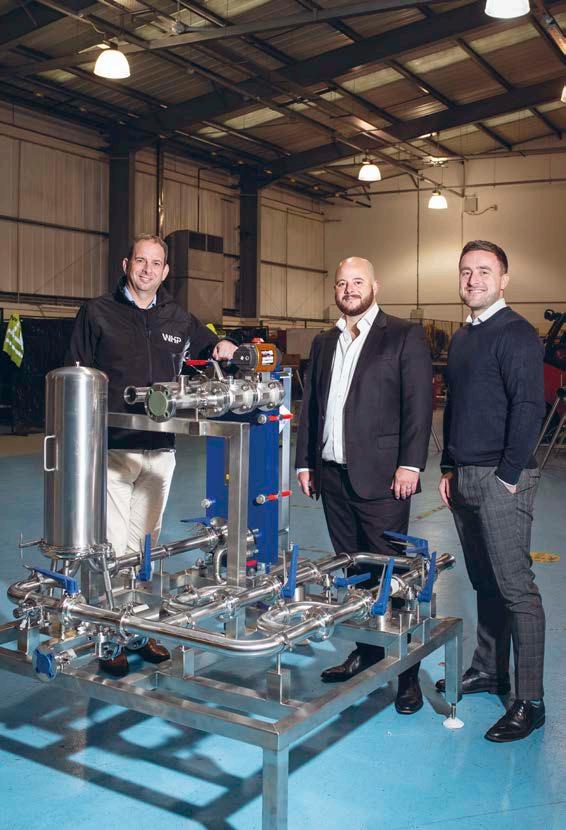
operate and the values we hold.
“A whole host of things have come from the relationship, not least a great amount of marketplace credibility from the longevity of our partnership.
“And it is no exaggeration to say WHP Engineering was part of the catalyst for us to enter the life science and STEM sectors.
“Working with the business, and understanding more about its fantastic projects, certainly gave us a push to launch our science division two years ago.”
Anthony adds: “Our relationship goes far beyond a transactional agreement.
“It has evolved - and continues to do so - and we’re excited to see what the future holds.”
19
Recruitment_
Advertising feature_Jackson
Hogg
Too busy with the present to think about the future?
As economic uncertainty continues into the new year, many of us remain focused on our day-to-day fiscal stability. However, Stephen Straker, independent financial adviser in the North East and Scotland team at Continuum Financial Services [pictured, below], tells North East Times Magazine about the importance of planning for the long-term.

Planning makes a big difference
As recent events have made very clear, we cannot see what is around the corner, but that doesn’t mean we can afford to simply wait and see what comes along.
Your future is too important to leave to chance, and financial planning makes a huge difference at every stage in your life.
Mortgage
Buying a home is a priority for most of us. Without planning ahead, however, just getting a deposit together may be impossible.
With a mortgage planned around your needs and circumstances, you may not only be able to afford a home, but afford a better property and pay it off early too.
Protection
Life can be uncertain, and when we have a family who depend on us, uncertainty is something we cannot afford.
Without planning, and a proper financial safety net to provide an income if you were to die or unable to work because of illness or accident, you and your loved ones are at risk.
Everything you have worked for could be lost.
With a carefully planned package of life insurance, income and health cover, you could have complete peace of mind.
Wealth creation
Making spare cash the basis of real wealth is something we should all consider.
Without planning, the chances of succeeding in investment by luck alone are small.
With investment planning and a proper strategy, though, you could see steady growth in your portfolio, building capital and providing income as you grow older.
-
Continuum Financial Services
For more information about Continuum, its services and how it could help you plan your finances, call Stephen on 07525 641600, email stephen@ mycontinuum. co.uk or visit www. mycontinuum. co.uk
Pension
Whether your retirement is imminent or many years away, you need to start thinking about the best way to build up a pension pot and the best ways to use the sum.
Without proper planning, you are unlikely to have the kind of pot you need for a comfortable retirement.
By properly planning, you can take full advantage of the Government’s tax concessions – and expert investment – to build up the lump sum you need.
After you are gone
Without proper planning, the taxman can help himself to the wealth you spent your life building up.
Inheritance tax could take 40 per cent of everything you leave above a threshold of £325,000 (for tax year 2022/2023 - frozen until 2028).
With proper estate planning, it may be possible to avoid inheritance tax liabilities altogether, and ensure your beneficiaries are your loved ones, not HMRC.
The information contained in this article is based on the opinion of Continuum and does not constitute financial advice or a recommendation to suitable protection, mortgage products or investment strategy.
You should seek independent financial advice before embarking on any course of action.
The value of investments can fall, as well as rise, and you may get back less than you invested.
Your home may be repossessed if you do not keep up repayments on your mortgage.
The Financial Conduct Authority does not regulate taxation, trust advice and will writing.
The levels, bases and reliefs from taxation depend on individual circumstances and may be subject to future change.
20
Finance_ Advertising
feature_Stephen Straker; Continuum Financial Services
www.mycontinuum.co.uk @MyContinuum

The Big Question
BILL SCOTT
Chief
executive Wilton Engineering

Succession planning is fundamental to any business, and this includes generating a consistent pipeline of talented people with the skills and competencies to contribute to a sustainable organisation, and indeed an economy.
In the engineering industry, we have faced the challenge of a skills shortage, due to a general lack of training and apprenticeships over many years, combined with an ageing workforce, and it has been the responsibility of businesses to address this and encourage the education system to keep pace.
Apprenticeships form a key element of this approach. Every business can benefit from engaging with apprenticeships, helping to not only mould their future generations of employees, but have an influence on their training.
We have invested in our own apprenticeship academy for this very reason.
We have employed qualified trainers to deliver highly-skilled, on-the-job training to our apprentices, who are also benefiting from working closely with experienced colleagues, gaining the skills we need them to achieve, alongside the qualifications and educational support they get from our partners at Hartlepool College.
They can also soak up the culture of a business and gain the crucial skills that only come from being in the workplace.
Colleges and training providers have an understanding of what employers need, which has to enable awarding bodies the ability to shape apprenticeship frameworks to the modern working environment, particularly fast-evolving sectors such as engineering.
LOUISE DOYLE Chief executive Mesma

When we recruit new staff, we start by asking, ‘why can’t this role be an apprenticeship?’, and this approach has resulted in half of our workforce joining as apprentices.
Creating high-quality careers is core to what we stand for.
Our commercial success is built on bringing talented people with us on a shared journeylearning, working and growing together.
For an employer to gain from investing in apprenticeships, apprentices must progressively develop their skills to become productive employees.
We share responsibility for the quality of the apprentice’s experience with the training provider to achieve this. When the programme isn’t good enough, everyone suffers.
22
National Apprenticeship Week returns in February, using the theme ‘Skills for Life’ to highlight the importance of young talent to companies’ success, while celebrating training programmes’ role in securing learners long and successful careers.
4Just how important are apprentices to organisations’ futures? And are there any elements of the learning system you believe could be improved?
The Big Question
According to recent reports, nearly half of apprentices leave their apprenticeship before it completes.
Employers must be part of the conversation to explore both the reasons and the solutions behind the numbers.
The apprenticeship system focuses too much attention on large employers, yet needs SMEs to engage for it to be successful.
Using unspent apprenticeship levy to encourage SME involvement seems obvious.
My one ask is to use it to help small business leaders fund the in-house capacity we need to mentor apprentices or T-level placement students.
We can work wonders if we’re supported to do so.
and utilising the available levy.
Far too often, SMEs are making large investments in apprenticeships and maxing out their levy, only to have qualified employees headhunted by organisations with big budgets once they conclude their training.
This causes huge recruitment problems for SMEs when it comes to securing and retaining talent for the future, and needs to be addressed.
MARTIN KEARNEY Managing director Nexus
FRAN CORMICAN Managing director Intelect


As a former apprentice, it’s easy for me to advocate the benefits of apprenticeships, not only to an organisation, but to the individual too.
Having utilised apprenticeships across the Intelect workforce for 25 years by adopting a ‘train to retain’ ethos, the company has seen endless evidence as to why they are so important.
If adopted correctly, they can be key to business growth and longevity, allowing companies to widen their capabilities, while retaining talented, innovative individuals.
In niche industries, apprenticeships are particularly advantageous, as not only can you mould young people to have the skills and knowledge required, but you can also utilise them to upskill your existing employees, helping to counteract skills shortages.
Apprenticeships have historically been plagued by the stereotype that they are inferior to university, which isn’t the case.
While in some instances an apprenticeship isn’t appropriate, the Government still needs to do more at younger educational levels to highlight the opportunities available.
There also needs to be an onus on larger organisations to commit to training more apprentices
We have a lot of long-serving employees, which is fantastic, because they’re loyal and absolute experts in their field.
But it also means we have an ageing workforce, which makes apprenticeships vital for our long-term future.
We recruit about ten apprentices each year, in a range of roles across the business, and more than 95 per cent of them move into a higher apprenticeship or full-time employment with us on completion.
We’re committed to developing early career paths, which provide us with solid succession planning for critical roles and gives the apprentices bespoke skills and competencies.
They have a great chance of getting a permanent job at the end of the apprenticeship, and we gain skilled and engaged employees who can build their careers with us and secure the future of our workforce.
Our apprenticeships are often for very specific job roles, which need very specific training.
It’s essential the training meets the needs of us and the apprentices.
The partnerships we have with learning providers are vital, and only successful through regular communication and good working relationships.
We’ve got a new learning centre, in South Shields, which is the perfect environment for apprentices to start their training, and we’re investing half a billion pounds in new fleet, track and service improvements over the next five years.
There is a lot going on, and the enthusiasm and commitment apprentices bring is essential to a successful future for Nexus.
23
The Big Question
Delivering opportunities for long-term success
A talented workforce is fundamental to business success and, thanks to a longstanding apprenticeship partnership with Northern Skills, international software firm Sage is continuing to realise its goals. Here, Steven Hugill speaks to award-winning apprentice Adam Tinning about how the alliance’s vocational learning programme has catalysed his career, and hears too from Middlesbrough College Group’s Matt Telling and the technology company’s Vicky Rowland and Lisa Miller to learn more about the organisations’ fruitful relationship.
A company’s growth is contingent on many things, not least a robust talent pipeline.
Just ask Sage.
Though renowned it may be for game-changing business accounting, payroll and HR software, the firm’s success is equally predicated on an accompanying skilled workforce guiding customers across their myriad journeys.
And helping it do so is Northern Skills.
Having struck up an alliance seven years ago, the relationship is today stronger than ever, with the dedicated apprenticeship and training arm of Middlesbrough College Group continuing to ensure Newcastle-based Sage has access to the very best workers of tomorrow.
Central to the partnership is the delivery of courses that nurture staff for customer support and marketing roles, across levels two and four, respectively.
And it works.
A strong cohort of former Sage apprentices now occupy senior roles, their careers catalysed by a combination of real-world experience and classroombased learning.
It includes Adam Tinning, who, having begun in a customer support position, is now helping oversee the expansion of a flagship HR platform.

He says: “I left school in 2020, just as COVID-19 hit, and, knowing university wasn’t for me, began looking at jobs.
“I was taken on in October of that year on Sage’s apprenticeship programme, and worked on the phones and webchat, taking operational queries across payroll and accounting services, which gave me a great introduction to the business.”
With his ability and can-do attitude complemented
-
Northern Skills
For more information about Northern Skills, its apprenticeship courses and how your business could forge a talent partnership with the training provider, visit www. northernskills. co.uk, email info@ northernskills. co.uk or call 03453 404040.
by knowledge accrued on day-to-day office tasks and further insight gleaned from the academic element of his two-year Northern Skills course, Adam’s stock quickly began to rise.
Such was his progress that the 20-year-old, who hails from Benton, North Tyneside, was named apprentice of the year and customer service apprentice of the year at a recent Northern Skills awards ceremony, and dubbed ‘one to watch’ by bosses at North East-founded Sage.
While the accolades were incoming, however, Adam was looking outwards, using the platform built by his apprenticeship to take the next steps in his career.
He says: “Whenever I do something, I do it to the best of my ability, and during my apprenticeship, I was constantly thinking about what might be next.
“I knew I didn’t want to leave Sage - I love the organisation and what it stands for - so I took on more responsibilities, to broaden my knowledge and experience, while looking at opportunities internally.
“I acted as a team manager, did a lot of coaching, helped employees coming into the business and shadowed other departments to find out what suited me.
“And it led to my current role, as a customer success consultant for Sage HR, which I began in October.
“I maintain customer relationships, making sure there are no issues for those using the platform while helping with additional modules to further support businesses processes,” says Adam, whose apprenticeship ended in March last year.
He adds: “The relationship between Sage and Northern Skills has been fantastic for me; it really helped get my career started.”
Matt Telling, group director of business engagement and partnerships at Middlesbrough College Group,
24
Education_ Advertising feature_Northern Skills
@northernskills_
www.northernskills.co.uk
is equally effusive, highlighting the many strands of opportunity apprenticeships provide to weave longstanding careers.
He says: “The model is tried and tested; we train anywhere between 1500 and 2000 apprentices every year, and it provides so much scope for building a foundation of skills.
“Earning while you learn, while banking fantastic experience, throws up openings to make great strides.
“Just look at Adam; to see a young man driving himself forward, with so many prospects, is brilliant.”
Matt adds: “We’re really proud to be working with Sage to nurture local talent, and are looking forward to helping its workforce of the future follow in Adam’s footsteps.

“But we couldn’t do it without great people like Vicky Rowland - Sage UK and Ireland’s early careers lead - and Lisa Miller - the company’s early careers talent acquisition partner - and their teams.
“They invest some much time, money and energy into offering opportunities for people that make a huge difference.”
Adam’s journey, says Vicky, illustrates perfectly the software company’s succession planning framework, which places great emphasis on looking locally to source its next generation of senior figures.
She says: “If you are genuine about breaking down employment barriers, there is no better way to do that than by establishing a robust apprenticeship programme.
“By enabling apprenticeships with providers like Northern Skills, we are allowing people in the community to be successful and progress their careers to a high level.
“Our apprentices are on exactly the same path as our graduates and interns - they are the future leaders.
“And Adam is a great example of how our programme with Northern Skills enables people to grow.

“During his assessment period, he was very nervous, but as soon as he started his course, he excelled.
“After nine months, he presented his case study to thousands virtually at a CIPD conference, and received a standing ovation.”
Vicky adds: “There is a real sense of togetherness here - whether you are an apprentice, graduate or intern, you are part of the Sage UK and Ireland community, and there are mentors available every step of the way to support your journey.
“We offer apprenticeships from level two to six, and there is something for everybody.
“Our opportunities go beyond school leavers and 16 to 25-year-olds, they are available too for those who are older and looking to return to work and learn a new trade.”
Lisa adds: “There is nothing better than watching apprentices move into their associate roles.
“Whether they stay in the same team, or move to something else, it is great to see them progress.”
25 Education_ Advertising feature_Northern Skills
North East Times networking event






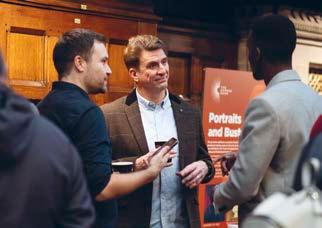
North East Times Magazine welcomed more than 50 guests to a networking breakfast in association with Northern Skills.
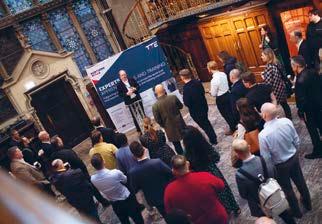
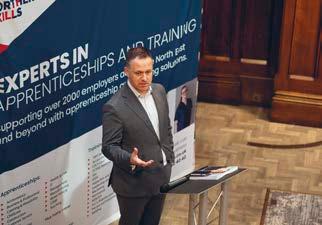
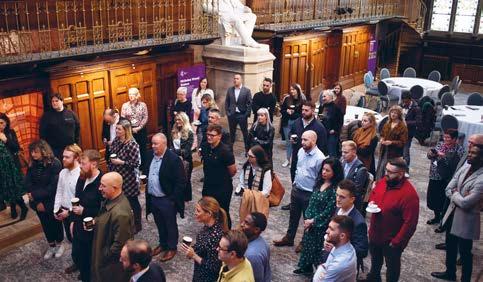
Held at The Common Room, in Newcastle, attendees made new connections as Matt Telling, group director of business and engagement partnerships at Middlesbrough College Group – which includes Northern Skills - spoke of the organisation’s commitment to helping shape the region’s economic future by providing bespoke apprenticeship and training solutions.
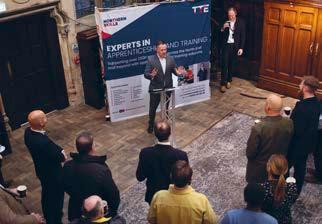
26
Event_ North
Times
East
networking event

Pictured, above, are Bernicia's ten new apprentices, with employability manager Jackie Johnson and chief executive John Johnston, centre
New apprentices building Bernicia’s future
North East housing association Bernicia is developing its future workforce from within. Its latest crop of apprentices is embarking on the same path taken by many others now building successful careers with the business.
www.bernicia.com @BerniciaGroup
The ten new apprentices taking their first steps into the world of work at Bernicia are treading a well-worn path to success.

Since the Ashington-headquartered business began its apprenticeship programme a decade ago, it has recruited more than 60 people, with 96 per cent of those deciding to stay and pursue their career with Bernicia on completion of their training.
Apprentices work under the guidance of experienced colleagues across every facet of the business, spanning electricians, joiners, plumbers, plasterers and bricklayers through to housing assistants, IT support, procurement specialists and business administrators.
They spend between 18 months and four years on the programme, combining paid employment with one day of training per week with local colleges and learning providers.
Several apprentices have gone on to gain level three
and four qualifications and risen to senior leadership and management roles – creating Bernicia’s very own homegrown talent pipeline.
Bernicia’s apprenticeship programme is a pillar of a £2 million investment - pledged in its corporate strategy - to help people in local communities access work and new opportunities.
Jackie Johnson, employability manager, heads up a new team of experienced industry professionals consisting of employability business partners Dionne Smith, Anthony Burdis and monitoring officer Amelia Lyall-Rollin.
The team works with partners across the North East business and education sectors to build aspiration, increase confidence and provide access to training, skills and job opportunities.
Jackie says: “It’s life-changing for these young people as they take their first steps into what we hope will be successful careers for all of them.
“We are growing our next generation.
“We’ve so many examples of young people who joined us as apprentices who have gone on to fill important roles within our business.
“We engage with local schools and colleges to promote our apprenticeship opportunities, and our employability team organises work placements and CV and mock interview support to help prepare students for the world of work.
“We plan to continue to invest in our apprenticeship programme over the coming years to develop our own talent in line with business needs and succession planning - and are planning to invest in green apprenticeships in the future too.”
One of those homegrown success stories is Ryan Irving-Carr.
28
Business_ Advertising feature_Bernicia
Joining Bernicia at 20 as an apprentice plumber, he has risen rapidly through the ranks.
Now 12 years on, he is assistant director of assets, leading a team of 20 and overseeing the building maintenance programme of Bernicia’s 14,000 homes and retirement living accommodation.

He says: “I was just trying to get a trade under my belt when I came to Bernicia.
“I didn’t want to be saddled with debt from university, and the opportunity to learn on the job while getting a salary appealed to me.
“As it was, the professional and academic route opened up to me as part of the apprenticeship, and I gained a first-class building surveyor degree from Northumbria University.”
Rising star Anna Humble joined Bernicia as an apprentice three years ago and was recognised by her colleagues as apprentice of the year in staff excellence awards.
Anna is now seconded into the role of housing officer.
She says: “Throughout the last three years of my apprenticeship, I have enjoyed both studying at college and learning ‘on the job’.
“My colleagues have been a huge help to me, and every day is different.
“I hope to get the opportunity to apply for a permanent housing officer position at Bernicia and continue studying for my foundation degree.”
Fully-qualified Bernicia electrician Sarah Boyle is reaping the rewards of a life-changing decision to plug into career success.
At 26, and after eight years’ customer service work at a supermarket, she decided it wasn’t for her, and took up an apprentice electrician role at Bernicia.
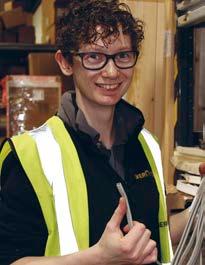
Now a valued member of the property maintenance division, she is Bernicia’s first fully-qualified female tradesperson.
Bernicia assets and property project manager Nick Riordan served six years in the Royal Air Force –completing four months of medical evacuation work in Afghanistan - before seeking a fresh challenge.
He says: “I terminated my military service without any real plan, so the Bernicia apprenticeship was an opportunity to settle back into civilian life, and it has since served as a foundation to develop professionally and academically.
“I have been fortunate to have had a number of
Sarah Boyle, left, Bernicia electrician, and Ryan Irving-Carr, Bernicia associate director of assets
Pictured, below, from left to right, is Bernicia's employability team of Dionne Smith, Anthony Burdis and Amelia Lyall-Rollin, with employability manager Jackie Johnson front right BerniciaFor more information about Bernicia’s careers programme, including its successful apprenticeship pathway, visit www.bernicia. com/careers/

opportunities at Bernicia, all of which I am endlessly grateful for.
“In my current role, we supervise the delivery of planned investment work on our stock, ensuring efficient and effective value for money is achieved.”
She adds: “I was so happy to get an apprenticeship at Bernicia, I couldn’t stop smiling, I just wanted to do this so much.
“Hopefully, I’ll stay at Bernicia after my apprenticeship; I’m getting used to concentrating hard and remembering how to do things, like putting in kitchens, fitting doors and new skirting boards.”
29
Apprentice joiner Libbi Knight is pursuing her dream of a career as a tradesperson, working alongside skilled joiners as part of a team that prepares Bernicia homes for new tenants.
Business_ Advertising
feature_Bernicia
Royal Grammar School
NewcastleFor more information about Royal Grammar School Newcastle, visit www.rgs. newcastle. sch.uk, email communications@ rgs.newcastle.sch. uk or call 0191 281 5711
Hat-trick of successes for Royal Grammar School Newcastle
www.rgs.newcastle.sch.uk
@RGSNewcastle
Staff and pupils at Royal Grammar School (RGS) Newcastle are full of cheer after it received a top accolade for a third year running.
The school has been named the North East's Independent Secondary School of the Year for Academic Performance for 2023.
The accolade was bestowed by Parent Power, The Sunday Times’ definitive schools guide, and comes after RGS achieved the title in 2022.
It also builds on its 2021 naming as Sunday Times North East independent school of the decade.
Headmaster Geoffrey Stanford says: “To be recognised again as the top independent school for academic performance in the North East is a remarkable honour.
“We are rightly proud of our consistently
outstanding public examination results, the product of our students’ hard work and determination, plus the expertise and encouragement of our staff.
“To have more than 90 per cent of A-level grades at A* to B, and 85.40 per cent of GCSEs at A* to A, is incredible, and competes with the best schools in the country.

“The fact this award comes after we’ve celebrated our best year in terms of our social impact is also hugely rewarding.
“In the past year, 7300 students from 76 local state schools shared in 23,000 hours of RGS partnership activities.
“More than 300 teachers from partner schools received 1500 hours of CPD, or collaborated on curriculum development.
“More than 40 RGS partnerships projects have taken place, including maths, physics, computer science, robotics, sport, languages, classics, debating, UCAS mentoring and much more.
“This award rounds off what has been an incredibly proud few months for everyone involved with the school."
Widely acknowledged as the most authoritative survey of the country’s best performing education establishments, the latest edition of Parent Power ranks 1700 schools according to the latest GCSE and A-level exam results.
Helen Davies, Parent Power editor, adds: "League tables are not the only criteria a parent can use when choosing a school, but they are a good starting point.
“We want to celebrate excellence. We want to champion schools that are doing wonderful work.
“We want our children to be well-nurtured and well-taught.”
30 Education_ Advertising feature_ Royal Grammar School Newcastle
Royal Grammar School Newcastle is celebrating after topping The Sunday Times’ North East independent school league table for a third consecutive year.

North East Marketing Awards
The leading lights of the region’s marketing sector shone brightly at the North East Marketing Awards in December.

The latest North East Marketing Awards showcased a ‘who’s who’ of creative and innovative talent at the Hilton Newcastle Gateshead on December 1.



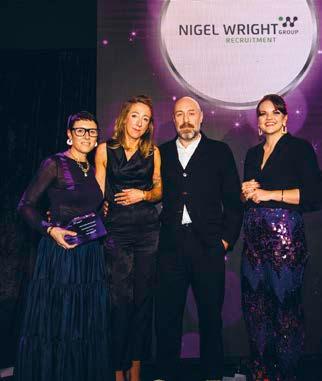
The sector came out in force to celebrate the very best the region has to offer in marketing.
Organised by Echo Events and sponsored by Nigel Wright Recruitment, the awards attracted 400 professionals from agencies and in-house teams from across the North East.
As well as the awards handed out, highlights also included an improv rollercoaster from The Suggestibles and live music.
The highest accolade went to Julie and Stephen Drummond, founders of marketing agency Drummond Central, who received the outstanding achievement award for their contribution to marketing and the region.
The evening was expertly hosted by the inspirational Kirsty Hulse, and the passion and enthusiasm in the room was infectious.
Find the full list of winners and finalists at www.northeastmarketingawards.co.uk
32 Event_ North East Marketing Awards







33 Event_ North East Marketing Awards
Haines Watts
For more information on how Haines Watts’ specialist tax incentives and reliefs team could support your business with your R&D tax relief strategy, contact Jonathan on 0191 269 9960 or email jscott@ hwca.com
Spotting the opportunities in a changing tax landscape
After a year of political change, the Autumn Statement brought yet further transformation, with plans unveiled to overhaul flagship Government research and development financial policy. Here, Steven Hugill speaks to Jonathan Scott, tax partner at accountancy and business advisory firm Haines Watts, to learn more about the opportunities available to businesses in the changing tax landscape.
www.haineswatts.co.uk @haineswatts
The last three years have done many things, not least keep lexicographers rather occupied.
From COVID-19 to the dramatic shifting of global political, economic and social environments, we’ve all been searching for definition.
And, as watershed change to flagship Government research and development (R&D) financial policy is readied for introduction, many business owners are once again looking for meaning, seeking to understand how the revision could affect their fortunes.
With small and medium-sized enterprise (SME) R&D tax relief - a backbone for many start-ups - set to be significantly reduced, and the research and development
expenditure credit (RDEC) model - used by companies with more than 500 staff and turnover in excess of €100 million - primed to rise, a new picture will soon emerge.
Jonathan Scott, tax partner at accountancy and business advisory firm Haines Watts, says: “The main bulk of R&D relief goes to SMEs, they are the ones that are going to be hardest hit by these changes.

“And the proposals create a double compound for loss-making SMEs, with the worry being we’ll see a lot of innovative start-ups not get through their first cycle of R&D.”
However, Jonathan says the shift also presents many opportunities for business owners, with numerous financial support measures at their potential disposal.
They include the Government’s Patent Box scheme, which encourages operators to retain and commercialise intellectual property in the UK by applying a lower, ten per cent rate of corporation tax to profits earned from inventions.
Jonathan says: “R&D tax relief has been such a lifeblood for businesses for the last 20 years that many haven’t explored other options.
“But there are a number to consider.
“Some might be running calculations - which we are doing for clients - around claiming under the RDEC model, as opposed to the SME model, to help with cashflow and prepare for what many expect will be a slimming down of policy by the Government to eventually create one relief scheme in the coming years.
“Others are looking at Patent Box, which has potential to more than half tax bills. This represents massive benefit for SMEs, and we’re seeing our largest ever uptake.
“Historically, there has been a perception that getting a patent costs six figures, but in essence you can get one
34 Finance_ Advertising feature_Haines Watts
on some inventions in the UK for around £5,000.
“And it provides a real commercial boost, because companies can put patent numbers on inventions and marketing material, increasing exposure and potential market share.”
Grant funding is another fertile area of support, as are legislative changes by HMRC to include datasets and cloud computing costs in R&D relief.
Jonathan adds: “In the past, the region has carried a kind of mentality that, ‘if it looks too good to be true, it probably is’.
“But there are many pots out there, both locally and nationally, that can provide financial assistance, with Innovate UK, for example, being a great source.
“Businesses just need to know where to look, and what type of sectors and organisations these funds want to support.
“Similarly, the allowing of additional computer and data costs around R&D claims represents a boost.
“Software and data is being used increasingly as
Government changes at a glance
Headlined by a proposed cut to the existing SME deduction rate, from 130 per cent to 86 per cent, the Government’s changes also include lowering the SME credit rate from 14.5 per cent to ten per cent, while increasing the RDEC rate from 13 to 20 per cent.
companies move from physical prototypes to the metaverse, and we’ve got a lot of tech firms in the North East, including many that work on video games, which could really benefit from the change.”
Another significant area of change to consider, says Jonathan, is new HMRC regulation focused on eliminating spurious claims.
Highlighting that eight people have been arrested for submitting fraudulent R&D tax relief applications, Jonathan says it is imperative organisations understand the new matrix while engaging the support of a qualified tax firm, such as Haines Watts, which are governed by ethics and standards.
He says: “Tax isn’t a regulated marketplace, and a lot of R&D advisors have sprung up in recent years.
“HMRC’s legislation will bring things back into line, because a key element includes a demand for all company tax returns to include an advisor’s name.
“That means enquiries will be able to hone in on individuals or agents if claims can’t be backed up.”
The changes to financial policy and fraudulent activity come against the backdrop of the first fall in the value of UK R&D tax relief for more than 20 years.
According to latest HMRC figures, firms claimed an estimated £6.6 billion during the 2020/2021 tax year, which was four per cent down on the £6.9 billion recorded in the previous 12 months.
However, Jonathan says the mechanism remains a key strategic option in ensuring financial stability.
He says: “There are multiple reasons for the fall in value, one of the major ones being that this is the first set of statistics we’ve seen since the pandemic.
“So, as well as the impact of furlough on innovation, some businesses may have had to reassess their cash flow needs, meaning some companies may have been more reserved in claims and others, while eligible, may not have claimed at all.

“The figures can also be altered by start-ups changing their status from SME relief to RDEC following private investment, and, naturally, some businesses have probably asked themselves if now is the best time to invest in an R&D project.”
Jonathan adds: “We’re in the middle of a massively changing landscape, and SMEs are bearing the brunt of the cost of living crisis, the increase in tax rates and the increase in wage inflation.
“It is tough, and there are only so many ways to turn.
“And that is why having an arsenal of tax reliefs, of grant funding and multi-faceted advice, is key to plugging a cashflow hole.”
35
Finance_
Advertising feature_Haines Watts
A unique approach to digital engineering
Much like the trajectory of the many construction developments it supports, Wilson Gray Consulting’s standing is rising at a rapid rate. With its expert digital engineering services helping contractors progress eminent schemes across myriad sectors, it is gaining ever-increasing market traction. Here, Steven Hugill speaks to partner and operations director Lewis Clark, and associate director and digital construction specialist Lee Nichols, to find out more.
www.wilsongrayconsulting.com
LinkedIn: Wilson Gray Consulting
Lewis Clark and Lee Nichols pose for the camera, its repetitive clicks providing an alternative soundtrack to the usual murmured bustle of Wilson Gray Consulting’s (WGC) high-ceilinged office.
The scene is different too for the shoot’s two protagonists.
For Lewis and Lee are more accustomed to life behind the scenes at the digital engineering consultancy, combining their knowledge and technological expertise with the Prestwick Park business’ wider team to put WGC in the spotlight.
And it’s a glow that is becoming ever more illuminated.
From supporting the development of Teesside University’s £35 million BIOS biomedical building, to work at RAF Leeming, new Aldi supermarkets, the soon-to-open Northumbria Health and Care Academy, in Cramlington, and London’s £400 million One Leadenhall skyscraper, WGC’s catalogue is as enviable as it is varied.
Supporting the design, technical management and co-ordination of mechanical, electrical and public health (MEPH) systems from stages zero to six, the firm ensures contractors and organisations are able to deliver safe and financially sound schemes, many of which are covered by the Royal Institute of British Architects’ multistage MEPH Plan of Work charter.
And a key factor in its success, says partner and operations director Lewis, is WGC’s digital engineering prowess, which provides distinction in a crowded market.
He says: “We take a conceptual design and make it buildable - we breathe life into it.
“We’re very aware of risk aversity in construction, and we aid the mitigation process through our expert design and due diligence, and our unique approach to stakeholder engagement.

“It really sets us apart.”
Wilson Gray Consulting -
Established in June 2015, and based in Prestwick Park’s Swan Building, Wilson Gray Consulting’s expert services include consultancy, programme and cost management support, building physics analysis, MEPH design - from stages zero to six - and BIM level two to LOD500.
Furthermore, it provides DfMA drawing production and structural analysis, and energy and sustainability calculations.
Led by associate director Lee, the company’s 13-strong digital engineering team provides support across an entire project.
And its impact is profound, with many developers choosing WGC - which employs nearly 30 staff and will soon complement its Tyneside office with a London base - to transform blueprints into reality.
They include SES Engineering Services, which has selected WGC to support the creation of Teesside University’s Middlesbrough-based BIOS learning hub, highlighting its “can-do attitude and unique approach”.
Lewis says: “We go further than other consultancies, not least because of our internal capabilities, which include our talent pool, led by Lee, which has specific experience in detailed design and design for manufacture and assembly (DfMA), which is a key contributor to net-zero carbon construction targets.
“Our services ensure a project is successfully built, commissioned and handed over.
“And that is reflected in the unique process we adopt on all projects.
“SES Engineering Services know what we deliver; we’re helping them with BIOS, but we’re also supporting
36 Engineering_
Advertising feature_Wilson Gray Consulting
Lewis Clark, partner and operations director, right, in discussion with Stuart Wood, technical director, left, and Shaun Lane, associate director
them on the new Whitley Bay High School and are supporting SES’ parent company Wates Construction on the development of a new £25 million Welsh net-zero school.”
He adds: “We’re a crucial piece in the wider construction jigsaw, and, over the past few years, a lot of tier one operators have chosen to work with us.
“Dornan Engineering, under a construction management arrangement with Multiplex, engaged our services on London’s 37-storey Leadenhall tower.
“We’ve worked with Sir Robert McAlpine on Battersea Power Station, and, more recently, T Clarke approached us to support them on a new project for the Ministry of Defence at RAF Leeming.”
Such partnerships, says Lee, are, in no small part, thanks to WGC’s attention to detail, with its team’s proficiency complemented by next generation technology.
He says: “We build before the build - our software means clients can view a project in the exact manner it is going to be installed, further demonstrating key stakeholder engagement.
“They get full visibility of progress, right down to the closest possible millimetre.
“And it is getting us noticed; clients are hearing what we’re doing and wanting to engage our services.
“It is having a large impact on our ability to aid the progress of net-zero developments too.
“We’re capable of prefabrication design, and because we go that far with our modelling, we are able to offer
‘Set apart from others’ -
“We are proud to be working alongside Wates at Teesside University to deliver a new facility offering high-quality, leading-edge laboratories for science and clinical subjects,” says Jonathon Darwin, operations manager at SES Engineering Services.
He adds: “As part of our delivery strategy, we identified Wilson Gray Consulting as a preferred strategic partner to deliver the digital engineering package.
“It was their cando attitude and unique approach to delivery which set them apart from the others.
“Wilson Gray’s focus on design integration and collaboration is imperative to ensuring they deliver a successful project for all stakeholders.”
detailing of services to maximise off-site manufacturing.
“Such ability is really helping us push on.”
The demand, reveals Northumbria University graduate Lewis, comes too from WGC’s project co-ordination support, which allows clients to clearly map out build journeys through four-dimensional construction sequencing.
He says: “Our unique approach has been very well received, because it enables the flow of information, which is linked to a build sequence, to be released at strategic times.
“We focus on tangible areas, looking at priority points, to provide greater structure and focus.”
This includes, says Lee, the ability to sub-divide a development, which allows for more efficient management.
He says: “If you have a building with a 10,000m2 footprint, it is very difficult to oversee the entire space at any one time.
“So we split it into zones, and agree timescales with the client for each area, linking in procurement, technical submissions, workshopping of pertinent project protocols, such as builder's work in connection (BWIC) and the increasingly important aspect of fire stopping.
“Once complete, we move to the next zone, repeating the process until all are completed.”
Lewis says: “Our processes mean we understand the intricacies of a project, and are able to clearly plan towards the issue of key construction information with risk items mitigated.
“If DfMA is required for the scheme, we work closely with the logistical management team to influence tower crane positioning to maximise site logistics and efficiency.
Pictured, above, from left to right, are Lee Nichols, Wilson Gray Consulting’s associate director and digital construction specialist, and Lewis Clark, partner and the company’s operations director
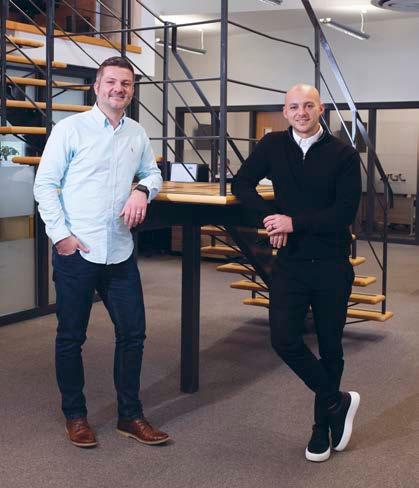
“We fast-track construction issue information and expedite the process.”
He adds: “It seems obvious, but the construction industry doesn’t always work in a logical process, and this is often the reason for project delays.
“Our understanding of design sequencing is imperative to a project’s success, and it all starts in the pre-construction phase.
“And it is why our processes set us apart.
“They have really boosted our portfolio, and they mean we’re well set to continue our momentum with a strong forward order book, working alongside many tier one operators nationwide.”
For more information, visit www.wilsongrayconsulting. com or call 0191 691 6770
37
Engineering_ Advertising feature_Wilson Gray Consulting
Through Thick

38
One of the North East's best-known taxi companies celebrated its 60th anniversary before the pandemic. And like so many businesses, Wallsend-based Blueline had to adapt to the unique challenges caused by COVID-19. The family-run company emerged stronger and more resilient to change after helping entire communities and thousands of customers - not least its own drivers - pull through the last couple of years. And as the industry tries to cope with post-pandemic, post-Brexit pressures and legislation for a carbon-free, greener future, Colin Young goes on a journey with the descendants of Blueline founder Colin Shanks to learn more about its colourful past and find out why it is primed for an equally bright future.
Thin Blue Line

39 &
Words by Colin Young
Photography by Christopher Owens
4Turn right off the A186 Station Road before the Segedunum Roman Fort & Museum into Buddle Street, second right into Carville Road, then take the first exit on the roundabout at the back of Wallsend Metro station...
You have arrived at Wooley Street, NE6.
It’s here that Blueline, one of Newcastle’s oldest and most successful family firms, first operated.
Tom Shanks, 28, parks behind the bus stop and toilet block.


This is the company finance director's maiden voyage to the first Shanks home and company base, where his grandparents Colin and Audrey lived and worked and expanded their family and their business.
“That'll be a fiver, please,” jokes Tom, who, tomorrow, has wedding duties to
perform in the Rolls Royce, one of the family’s most treasured possessions, preserved, in its own unique way - as Tom discovers later when he leaves a thumbprint on the paintwork - by company director Paul since it was purchased more than half a century ago.
The original houses are long gone, but somewhere among these rebuilt packed terraces in Wallsend, former prisoner of war Thomas Colin Shanks started a taxi company in 1958.
Based in London after the Second World War, Colin, as he became known, returned to Newcastle to run a tobacconist in Northumberland Street - now the Marks and Spencer buildingbefore jointly forming the original taxi firm NODA and eventually setting up his own operation.
“My grandparents were still running the tobacconists, and they just saved and
saved and saved,” says Tom.
“My grandfather bought an Austin Morris, which had a thin blue line across the side, made it his taxi and ran it from home, in this street.
“People started to recognise it as the ‘blue line taxi’, and it just grew and grew.
“That was when the expansion started, and he bought the offices in Wallsend to operate from there with two cars.
“When he died, suddenly, in 1990, Blueline had 60 to 70 cars.”
Last year, the business carried more than ten million passengers across the region.
4Turn left out of Wooley Street into Carville Road and left again into Buddle Street before taking the third left on to the A186 Station Road. After a mile, take the third right on to High Street East and first right into Sycamore Street...
You have arrived at Blueline HQ.
In the 1950s, the one-door, front and back office operation was a bench for two drivers, a telephone operator and a small office for Colin Shanks.
40
Blueline owns most of the properties on this block now, including the garage over the road where Colin's son and company partner Paul still tinkers to his heart's content - his son Cody has followed in his footsteps to become one of the firm's senior mechanics.
Behind the darkened glass of the corner unit is a labyrinth of offices and rooms, which host 20-plus staff including the taxi support team and call centre operators.
Nothing illustrates the progression the company has made more than the newlyrefurbished directors’ suite upstairs.

Once a small cubbyhole for admin and endless reams of paperwork, it's now an immaculate shrine to Colin, Audrey and the business.
A huge portrait of the couple on their wedding day dominates the room, and when you study other items on the wall
closely, you see the original documents from the company’s formation and a wellworn, framed Newcastle Gosforth rugby shirt.
And a Mickey Mouse watch.
Tom says: “Walt Disney’s daughter Diane came to the North East in 1978, and my grandfather drove her and her husband Ron W Millee, who was a Disney vicepresident, all over Northumberland and Scotland for a few weeks.
“At the end of the trip, they tried to give him 20 quid, which was quite a lot of money then, but he refused to take it.
“A few weeks later, they sent a watch from the States, and a letter from Ron, because he had refused to take any money from them.
“It’s an unusual piece of history.
“I always like to think they had a conversation back in the States with
Walt Disney about my grandfather, and someone decided to send him a Mickey Mouse watch in the post.
“We wanted to create a directors’ lounge, which is like an operational hub where you can chill or hold meetings, but also pays homage to our history.”
Downstairs in the call centre, it's noisy and slightly frantic to a newcomer; no surprise to those who know him, that Ian Shanks is the loudest voice in a room where 12 people are working in pretty close proximity.
Busy among them is Tarpit, from the London-based global tech firm E9, who is helping implement a new app for drivers which, in the long-term, will prove more efficient for them and their customers.
There are inevitable teething problems, and North East Times Magazine visits during a particularly challenging week.
The company has also installed digital screens in the back of 200 cars for adverts promoting local restaurants, hotels and attractions; fleets in Manchester and Liverpool are watching developments closely.
“I was on a flight from New York and there was a screen in front of me, which showed a Coca-Cola advert,” says Tom.
“I was totally locked in.
“We're probably even more engaged with the customer in the back of a cab, so we just thought, 'can we develop this and have more engagement with our customers when they move around the city?'
“And we were actually helped by the pandemic because QR codes became really popular, so we include those in the adverts.
“My old man backed it.
“He’s fantastic. He’s very old school, a proper Geordie, but he has this knack and this gut feeling of knowing what's right, and will happily take a punt on technology.”
During the course of the afternoon, only once does Tom refer to his dad, his boss, as ‘dad’.
41
Tom Shanks, with father Ian, in Blueline's new directors' lounge. Over their shoulders stand company founders Colin and Audrey
It's a line that has rarely been crossed, and the pair clearly thrive on the closeness and conflicts in the relationship.
“I’d been in the business for about four months,” recalls Tom.
“We’d been talking in this office and when we’d finished I started to go into the bathroom, and he said, ‘what are you doing? You don’t use that bathroom when you work here’.
“And I was like, ‘are you joking?’
And he said, ‘use the bathroom downstairs like everyone else.’
“The funny thing was that throughout my childhood, I'd been in that office and used that toilet.
“The day I walked through the door as an employee, it all changed.

“That's always been the way from day one.
“It can be tough. All relationships are tough, and there’s that line between father and boss which is very blurred.
“And it has challenged both of us in the way that we talk to one another in certain scenarios.
“And we get it wrong sometimes, but it has made us stronger.
"He has a fantastic knack of being right and is the most generous man I know.
“He's worked round the clock, throughout his life, for his family.”
In the kitchen, Ian takes a break from one of his 500 tasks and offers a cup of tea.
42
There is a lot to fast forward to get from two taxis and a tiny office to an empire which covers more than 200,000 passengers a week, drivers with apps, and television screens and adverts in the back of their seats.
Divided equally with brother Paul and sister Jane - a former mental health nurse who works in the specialist transport department - it now stretches to more than 60 properties and 21 limited companies.
The former Newcastle Gosforth prop, with the handshake of a friendly bear, was 27 when he took over the business. Because he had to. His father died of a heart attack aged just 67.
“I wanted to be a policeman,” says Ian, who also had to look after his increasingly frail mother.
“I got knocked back after the first police exams - only two from a class of 26 got through.
“And I was keen to be a farmer; I’d worked on a farm as a kid, but that all fell through too.
“So I ended up working in the taxi business alongside my dad, and I’m so glad I did.
“He died suddenly in 1990.
“We’d been to the town hall for a meeting and went for a bit of pork pie on the way back.
“I went to the office, he went to James’ Shoes, because he loved his handmade shoes, and then he was going to the bank.
“And he never came back.”
After father and son have posed beside Colin and Audrey's portrait - arranged by the family, with great difficulty, without Ian’s knowledge - he reflects on the growth of the business from this very room.
He recalls the conversation which proved hugely inspirational.
“I was sat about here,” Ian says, stretched out alongside his son on a lovely suede settee.
“My dad had just died, I was going through the paperwork, wondering to myself how I was going to pull this off.
“And I heard two of the drivers downstairs, outside the window, saying, ‘well that’s it, the company’s finished - or words to that effect - there’s no way the
young lad will cope, we’ve nee chance’.
“Well, that was all the incentive I needed.
“I’d left school at 15, dyslexic, not a qualification to my name, I was young, I was naive and I didn’t know what I was doing.
“But I knew I was going to work bloody hard to make the business a success.
And I did. I had to. We had two young kids to feed and drivers, most older than me, to keep in employment.
“The pressure was absolutely huge. Any wrong decision could affect so many lives.
“The only sanctuary I had was the rugby pitch, where my fellow players would look after me and I could forget about everything.”
4Turn left out of Sycamore Street and stop in one mile; look to your right.
You have arrived at the Blueline Development Centre (with adjoining taxi fleet and vehicle rental yard).
First, we take a mile detour to the Wills Building for the final photo shoot.

It all makes sense on our return to the purpose-built offices.
A huge landscape painting of the famous landmark in the pouring rain overwhelms the space where Tom and cousin Ben Bell spend most of their working lives, Tom's trusty two-year-old black lab Ruby and Baxter, Ben's miniature dachshund, never far from their feet.
"Our grandmother always said if she won the lottery she'd buy the Wills Building, turn it into a hotel and call it 'The Embassy Hotel',” Ben says.
“I think it harked back to the tobacconist days and Embassy cigarettes.”
43
And it's here the Blueline generational transformation is taking shape - Ian's son Tom is finance director and his daughter Pippa is executive transport co-ordinator; Jane's kids Ben and Jack are operations director and head of drivers, respectively.
And then there’s Paul’s son Cody, the senior mechanic.
Ben is at the firm’s Hartlepool compound - one of many remote sites alongside Consett and Stanley - and joins us online.
He helped guide the company through the pandemic and early lockdowns, which naturally had an immediate impact on drivers, co-ordinating the transport element for the entire North East COVID-19 vaccine roll-out at its height, while all the family worked with JR Holland to deliver groceries to homes, hospitals and schools across the region.
"Every day we were on site at the
vaccine centres, from seven in the morning, in the freezing cold, in high-vis jackets; all the family and staff were there,” says Ben.
“The camaraderie was just brilliant.
"And we were seeing all these frail, old people, who had been locked away in their homes, who were just so grateful to get out and talk to someone and get their jabs.
“It was amazing.
"It was really nice to get out there and speak with drivers every single day, and see them at the vaccine centres.
"It sounds bonkers, but we were probably a bit busier than normal, not with journey numbers, but in terms of trying to be creative with different approaches and new projects, putting them together and delivering them quickly.
"You had to think on your feet." And that continues today. As well as expanding on corporate
contracts, which include Emirates, Tom wants to launch a podcast.
He says: "The diversity of our customers fascinates me.
"Where are they going? Why are they in Newcastle? What are their plans, and who are they meeting?
"Everyone has a different story. And most people like to talk to our drivers, so I'd love to do a podcast from one of our cabs and tell the world why people come to the North East."
There are many challenges facing taxi firms in the post-pandemic, post-Brexit, Uber, carbon free(ish) era.
There is a severe shortage of drivers, particularly from Eastern Europe, and many retired during the lockdowns.
Taxi driver licences in the Newcastle area are also significantly more expensive than other parts of the country.
Tom, who is completing his PhD in management at Newcastle University, is keen the industry has a voice in Newcastle’s - and the whole of the North East’s - future, with both local and national government proclaiming ambitious public policy plans to deliver improved, greener transport systems.

He says: "Green legislation for carbonfree cities is going to have a huge impact on all drivers, not just taxi drivers, but it needs to be clear and constructive changes, not just change without considering the true implications.
"So why not consult with the industry that uses the roads and engages with people in the region more than anybody else?
“This is not about business, this is in everyone's interest.
“We have to get these decisions right.
"Government and councils think, 'you're just a taxi operator', and they won't listen.
“We've wasted so much time trying to get round the table; it was part of the reason for doing the PhD.
"If we can demonstrate this to them with the powerful data we have, then surely they'll listen to us."
Go straight on...
44
www.bluelinetaxis.com @BluelineNCL

Providing a sporting chance for all
Fresh from being named the country’s best higher education institution, Northumbria University is launching a new sport scholarship to help the next generation shine. Part of its wider Higher Education Without Barriers campaign, which aims to help students from all backgrounds succeed, the scholarship’s first year will support budding female coaches and officials.
www.northumbria.giving.co.uk @NorthumbriaUni
Northumbria University -
To support current and future students at THE University of the Year, find out more about the event, or join Enterprise as a headline or other sponsor, please contact james.wilkinson@ northumbria. ac.uk, peterstorey@ northumbria. ac.uk or john@ netimesmagazine. co.uk
Northumbria University is committed to widening participation.
Crowned University of the Year 2022 at the prestigious Times Higher Education (THE) Awards, Northumbria is a research-intensive modern university, with student diversity and social mobility at its heart.
In 2022, Northumbria launched its Higher Education Without Barriers campaign, to enable talented students from all backgrounds to access higher education.
Powered by businesses, charitable trusts and Northumbria alumni, it has raised more than £2 million and benefited more than 800 students in outreach, scholarships, hardship, well-being and enterprise.

The opportunity to go to university can be lifechanging but, for many, it is out of reach.
Through our campaign, we are building a community of donors, who have, so far, provided £750,000 in scholarships.
Scholarships enable businesses to promote their values and brand among the brightest talents of tomorrow.
Most importantly, however, they change lives.
We are keen to welcome new businesses in joining our network of supporters, which includes Santander, CBRE and Version 1, among others.
A scholarship is a significant investment in a person’s future, with benefits lasting a lifetime.
At Northumbria, we encourage students to pursue
their academic and personal passions, and have launched a new scholarship in sport.
We are proud of our sporting alumni, which includes Pete Bakare, Paul Blake, Martin Corry, Steve Cram, Jon Dutton, Ellen Falkner, Stephen Miller and Victoria Pendleton.
In its first year, the programme will support budding female coaches and officials.
Women make up only 18 per cent of qualified coaches and, despite recent developments – including women refereeing at the 2022 men's football World Cup – remain underrepresented in sport.
Alongside the scholarship, we are also launching
46 Education_ Advertising feature_Northumbria University
a new fund to support PhD students from all low participation backgrounds, to build upon the university’s excellent reputation in sport research.
We want to hear from businesses that share our vision and organisations that recognise the potential in talented sport leaders and seek to help them flourish.
It comes as no surprise that sport leaders make great business leaders.
‘There’s no I in team’ is one of the most used terms in sport, for which the reasons are well earned.
To raise funds, the university is holding a sports dinner later this year.
We are pleased to announce Enterprise Rent-a-Car as the event’s first headline sponsor and the first cosupporter of the scholarship, alongside Sodexo.
Louise Sivewright, Enterprise’s talent acquisition marketing specialist, says: “Enterprise is proud to support Northumbria and its students, and we are excited to be a headline sponsor of the event.

“Enterprise continues to work with Northumbria students in business and sport, as we believe those who participate in sporting activities possess leadership skills and key competencies that transcend business.

“We are looking forward to the launch of the scholarships, and to following the journey of recipient students.”
The dinner will bring together sporting guests, alumni, partners and students to showcase diversity and the transferable skills between sport and business.
Sponsorship packages, from £1000 to £10,000, are available in conjunction with North East Times Magazine.
We are committed to Higher Education Without Barriers.
Together, we can ensure nobody is left behind.
47
Education_
Advertising feature_Northumbria University
Cue
Todd & Cue
For more information about how Todd & Cue’s expert support can ensure your business has the correct insurance cover, call 0191 482 0050 or email info@ toddcue.com
Prepared for anything
Running a business means knowing your risks and planning ahead to avoid negative impacts. But with spiralling inflation having knock-on effects across every part of the business spectrum, it can be hard to keep up with the danger zones. Here, Glenn Cue, director of Chartered independent insurance broker Todd & Cue, tells North East Times Magazine why insurance is one area where businesses cannot afford to fail to prepare.
www.toddcue.co.uk @ToddCue
Proper preparation and planning prevents poor performance.
That old adage may have its roots in the military, but it’s never been more important for firms operating in the metaphorical minefields that make up today’s business landscape.
Inflation, workforce shortages and global delays in supply chains are all having an impact on companies in every industry, whether across their day-to-day operations, or in planning for the future.
The six Ps are particularly relevant when it comes to making sure a business has the right insurance cover, avoiding the risk of being underinsured and penalised in the event of a claim.
And, as Glenn Cue, director of Team Valley-based Chartered independent insurance broker Todd & Cue, says, no stone can be left unturned when it comes to making sure your business is prepared and protected.
He says: “Everyone is all too aware of inflation, everything is costing more, whether that’s buildings, materials, labour or the price of the stock a business might hold.
“So it is imperative to make sure a business has insurance cover that will counter those rises.
“It’s never been more important to insure on the correct basis.”
Glenn is armed with stats that make for sober reading.
According to industry experts, within the last four months to December 2022, some 83 per cent of UK
properties – both commercial and residential – were underinsured.
In the commercial property sector alone, it is estimated the figure equates to £375 billion of underinsurance.
Glenn says: “Unfortunately, some will take the view that if they underinsure for a certain amount, it means they’ll pay less for their premium.
“But that is short-sighted, and it’s what we work to avoid for our clients – we make sure they are insured for the correct amount.”
Index linked policies, where the insurer allows for the effects of inflation in the event of a claim, are the most straightforward way to avoid being underinsured due to spiralling costs.
But again, as Glenn warns, preparation is key.
He says: “Generally, a client knows their business inside out – they know what things will cost to replace, and how long they might have to wait for a key piece of plant.
“But the important thing with index linked policies is to start them from the right valuation position.
“At Todd & Cue, we encourage clients to get regular assessments of value – buildings should be surveyed, and contractors should look at their plant and lead-up time for replacement, for example.
“If a firm makes a claim and the insurer sends out an adjuster, the starting valuations that the insurance cover is based on need to be correct to ensure the policy compensates the insured properly.”
48
Insurance_
Advertising feature_Todd &
Shortages and delays across the supply chain are also adding to firms’ inflationary woes.
The North East is facing an acute shortage of new vehicles, with a computer chip supply issue impacting manufacturers.
The knock-on effect is that prices for used vehicles are spiralling and choice is squeezed – an example of the lateral thinking a business needs to employ when considering its insurance cover.

Glenn also stresses the importance of business interruption cover, which again must take into account the specific factors facing the sector a client operates in.
He says: “Business interruption cover typically comes with an indemnity period of 12 months, but we are advising our clients to extend longer, even up to 36 months, such are the issues in replacing plant and stock and, most importantly, getting the business back to pre-loss position.
“As a broker, through our client discussions, we seek to understand these and other issues to ensure all covers bought are adequate.”
There has never been a more important time for business owners to take a pragmatic approach to insurance cover, and to speak to an expert who will help them work out exactly what they need to ensure their business is protected.
Glenn adds: “Year-on-year, clients come in and say, ‘no changes, keep our cover at the same level as last year’.
“But there must be changes; everything changes when inflation rises.
“That’s where we prove our worth to clients, and make sure they are fully prepared for the worst case scenario.”
A national reputation -
For more than 40 years, Todd & Cue has been a market specialist in providing insurance cover for the licensed trade.
The company works with thousands of pubs and restaurants across the North East and the wider UK to offer tailored policies with competitive premiums.
In a niche market, Todd & Cue has built a reputation for supporting clients through the highs and lows.
With generous limits and enhanced policies, the company has seen its retention rate for clients at almost pre-pandemic levels.
Glenn says: “We’ve been in this sector for a long time, it’s not one you can just dip your toe in.
“We’ve built a reputation nationally for being competitive and flexible with clients.
“For example, many pubs have a lot more furniture and equipment outside since the pandemic – we’ve adapted our cover to reflect that.
“The post-Christmas period is challenging for the licensed trade sector, but we will still be here providing clients with the best service and cover.”
Glenn Cue, director
49
Insurance_ Advertising feature_Todd & Cue
Market research_
Advertorial_Explain Market Research & Citizens Advice Gateshead
Explain Market Research
-
Explain Market Research is an insight and engagement agency based at The Core, on Newcastle’s Helix development. Its team has delivered innovative insight to clients nationally for close to 30 years, with its approach always one of collaboration, to ensure the delivery of best practice solutions that come with added value.
Pictured, top right, are Kim Davis and Holly Shiel-Redfern, partner and chief executive, and partner and commercial director, at Explain Market Research
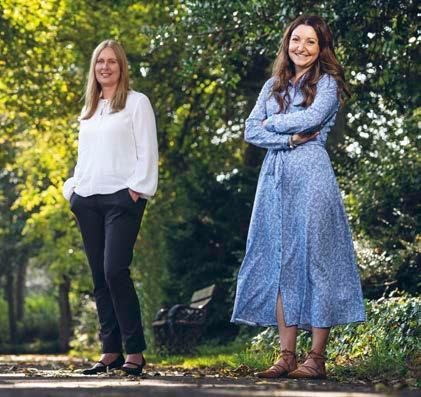
A crisis on our doorstep
Holly Shiel-Redfern and Kim Davis, partner and commercial director, and partner and chief executive, respectively, at Newcastle-based Explain Market Research, are supporting Alison Dunn, chief executive at Citizens Advice Gateshead, to raise awareness of how North East businesses can help push back against the cost of living tide. Here, they reveal more about their alliance, highlighting the Warm Spaces programme, which is providing people with a helping hand over the winter months.
www.explainresearch.co.uk @ExplainMR www.gateshead.gov.uk/warmspaces
While we are all acutely aware of the cost of living crisis, it’s safe to say that in the peak of last summer, none of us were thinking about the prices associated with heating our homes or keeping our children warm over the winter.
Alison Dunn, chief executive of Citizens Advice Gateshead, was, however.
She was already raising awareness of the imminent crisis on our doorsteps, highlighting to many how the cost of living crisis posed a serious risk to the lives of people in our communities.
And with the support of Gateshead Council, Alison embarked on a pioneering campaign.
The Warm Spaces programme has since gained national traction, secured prime media coverage across the UK and been adopted by a range of other community groups and local authorities.
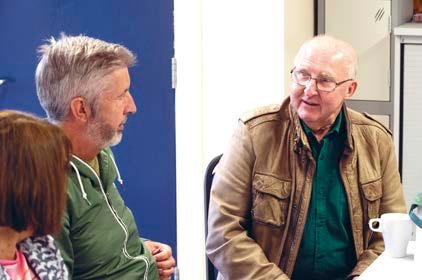
It was a meeting on an August afternoon that led to Explain Market Research stepping into the stark reality.
We have since supported Alison to share the message and to bring together other regional businesses and organisations, to give a voice and movement to the campaign.
It is this message we bring to other North East businesses, in the hope we keep passing the baton, and that with greater understanding comes more action to support those in need of help.
Here, we speak to Alison, to learn more about the cost of living crisis, and what regional businesses can do to support the Warm Spaces initiative.
50
Gateshead residents enjoy a chat and hot drink as part of the Warm Spaces programme (Picture: Gateshead Council)
Tell us about Citizens Advice Gateshead

Citizens Advice Gateshead is one of the largest providers of social welfare advice in the North East.
Our vision is to create a fair society for all, with lives well lived.
We supported 19,000 Gateshead citizens with more than 80,000 advice issues last year, which included everything from problems with a mobile phone through to rent and mortgage arrears, relationship breakdowns, fuel poverty and income maximisation.
Can you provide some data to illustrate the cost of living crisis, particularly in the North East?
In 2021/2022, the North East overtook London in having the highest child poverty rate in the UK. The figure stood at 38 per cent, up from 37 per cent in the year before.
This equates to a little more than 11 children in a classroom of 30, with the North East experiencing by far the steepest increases in child poverty in the UK in recent years.
But it’s not just households with children and people on benefits who are suffering right now, struggles are present across the wide spectrum of society.
Even moderate earners are experiencing hardship. For most people, income is not keeping up with inflation, interest rates (and therefore rent and mortgages) are rising at a time when incomes remain relatively static, making it harder and harder for people to make ends meet.
Energy costs are a particular concern, and to illustrate just how worried people are about this, as a Citizens Advice network, we've received five years’ worth of demand for energy advice in just nine months.
Such a level of demand is unprecedented.
Tell us about the Warm Spaces initiative
Warm Spaces is a response to fuel poverty, which is rooted in community activism, local people and agencies coming together - enabled by Gateshead Council - to open their buildings and provide a warm welcome to people who need a helping hand during what we know will be a winter of discontent.
If you visit a Warm Space, you will be guaranteed a warm welcome, a hot drink and a warm space to sit.
Some Warm Spaces offer activities, others a living room-type experience, where you can read a newspaper, browse the internet and sit in comfort. Whichever space you choose, you will never be asked why you are there; you'll be treated kindly, with respect and dignity, and you'll not be forced into services (although they are available for anyone who needs a helping hand).
Some venues offer a light bite to eat and run their Warm Spaces alongside other services like food banks, food share markets and drop-in advice sessions.
To find a venue near you, visit www.gateshead.gov. uk/warmspaces
What can regional businesses do to support the initiative?
There are many ways to help. Ideas include:
• Sponsoring a Warm Space venue, by providing tea, coffee, hot chocolate, milk and biscuits
• Donating winter warming merchandise, such as blankets, hot water bottles, flasks, hats, scarves and gloves
• Some community buildings would really benefit from a bit of TLC, minor building repairs and energy efficiency advice/measures
• If you're a catering business, could you support with food items that can easily be distributed?
• Provide support for Warm Spaces through marketing and associated promotion, especially with localised activity
• Utilising vehicles to provide a community transport offering
Where can businesses find further information about supporting Warm Spaces?
The network of Warm Spaces is about the enablement of people and communities to help each other through a difficult winter, and businesses have a key role to play in enabling the activity through social action.
If you've got an idea that could help - it doesn't matter if it isn’t mentioned on our wishlist - we'd love to hear from you.
To find out more, or to discuss how you might get involved, email warmspaces@gateshead.gov.uk
51
Alison Dunn, chief executive at Citizens Advice Gateshead
Market research_ Advertorial_Explain Market Research & Citizens Advice Gateshead
ROUNDTABLE: TOWNS AND CITIES REGENERATION
Unleashing the potential: Creating a
playing field for the North East to
The region’s place within the Government’s flagship ‘levelling-up’ agenda
Words by Steven Hugill
level
flourish
Boris Johnson called it his “defining mission”.
Rishi Sunak says he will deliver on the Government’s manifesto promise.
Jeremy Hunt says the Conservatives “remain committed” to the cause.
Much has been said about the ‘levelling-up’ agenda over recent weeks, months and indeed years, but how really has the North East benefited from the many pledges announced during despatch box discussions and PR statements?
That question, and a great many more, were the focus of a roundtable discussion between North East Times Magazine, national planning and development consultancy Lichfields and leading independent law firm for business Muckle LLP, which analysed the area’s place within Westminster’s much-vaunted regeneration policy.
Featuring leaders from the North East’s built environment, construction, education, finance, housing and legal sectors, the roundtable assessed the progress of the ‘levelling-up’ agenda, identifying where success has been achieved in the region, and highlighting where work remains outstanding if the Government is to truly close the commercial, economic and social divide between London and the rest of the UK.
52
CHANGES
To use the phrase ‘levelling-up’ is to conjure great many meaning to great many people.
For some, the Government’s regional equalising strategy is proof of a regime committed to delivering watershed economic and social change.
For others, it stands not as a panacea but mere party rhetoric, another stuttering iteration of the Northern Powerhouse vehicle fashioned during the Cameron and Osborne era.
For more again, it remains a frustrating conundrum, with appreciation of policy met with an equal measure of annoyance at perceived limited outcomes.
What is unequivocal among those voices, however, is the collective desire to see the North East flourish, to harness the innovative legacy of its heavy industrial

past and create a new age of prosperity.
And ‘levelling-up’ has the potential to deliver great transformative change - even if 2022 has seen the programme stutter, rather than sprint forward, following a delay to the publishing of a white paper and the summer and early autumn Westminster ministerial spin cycle.
And as the year ended, some green shoots were beginning to peep through.
According to the Chancellor’s Autumn Statement, the region is primed to accept a mayoral devolution deal, widely understood to include authorities in Gateshead, Newcastle, Northumberland, Sunderland and North and South Tyneside - and possibly Durham.
The newly-installed chief financial minister also committed the Government to at least £1.7 billion spending via a second round of the Levelling Up Fund, the initial tranche of which supported projects in Bishop Auckland, Newcastle and Sunderland, among other areas.

And all will be overseen by the returning Levelling Up, Housing and Communities Secretary Michael Gove.
Having unveiled the Government’s ‘levellingup’ white paper in early 2022, his reappointment provides an element of stability following the recent turbulence.
However, Jonathan Wallace, senior director at national planning and development consultancy Lichfields, said while the moves were abundantly welcome, the ambiguity around ‘levelling-up’ may well linger for some time yet.
He said: “We know ‘levelling-up’ is about making sure we bring regions and cities up to the same levels that the more prosperous parts of the country have reached.
53
AMID RECENT
TO THE NATIONAL POLITICAL LANDSCAPE, WHAT DO YOU UNDERSTAND ‘LEVELLINGUP’ TO BE, AND HOW DO YOU DEFINE THE PROGRAMME’S PERFORMANCE TO DATE?
Roundtable: Towns and cities regeneration
“And we did finally get some definition with the white paper.
“But, given the political changes, I suspect we’re going to go through some redefinition, as the new Government works through what it can achieve.”
Stephen Patterson, chief executive at NE1, Newcastle’s business improvement district company, agreed, adding that while some gains have been made, and ‘levelling-up’ carries the right sentiment, there remains much to do before parity is achieved nationally.
He said: “‘Levelling-up’ means the Government now has a regular stream of funds the city can pitch for, and they are certainly welcomed.
“But while the intent is very good, the funding criteria has been hugely biased to London and the South East - whether it be around congestion, land values or economic impact - which has sucked funding away from the rest of the country.
“And that is why I don’t think we’re quite there when it comes to ‘levelling-up’.
“It has been a good start, but we need to do more.”
Erin Peart, director of campus services for Northumbria University, concurred.
She added: “It is about equality; we all want to be on a level playing field.
“Going forward, it’s about how we get an equal share.”
“We finally got some definition on what ‘levelling-up’ means with the white paper. But, given the political changes, I suspect we’re going to go through some redefinition, as the new Government works through what it can achieve”
the Treasury.
The second, primed for land that was once a vehicle dealership, and which sits between a valet business and a working men’s club, will provide a permanent home for existing economic campus staff, as well as further new arrivals, as the Government presses ahead with plans to decamp more than 1000 Whitehall staff from London to the railway town.
Elsewhere, Westminster’s ongoing support of Tees Valley Mayor Ben Houchen is helping his Teesworks venture turn ex-steelworks land near Redcar into a global clean energy hub, and five schemes, including Stockton’s transformation of its high street into a swathe of greenery and riverside walkways, secured multi-million-pound backing from the first round of the Levelling Up Fund.
Neil McMillan, director of iMpeC Developments, which has been instrumental in originating and delivering the Durham City-based Milburngate business, leisure and residential scheme, told the roundtable: “The Treasury alone can have a big impact on Darlington, with other things happening organically around it.

For all the aforementioned uncertainty, and the previous stalling of the white paper, the ‘levelling-up’ story does have some tangible chapters.
One of the most significant is being written in Darlington, where two squares of land, both former unkempt car parks patchworked by years of makeshift repairs, stand ready to drive Government legislation.
The first has already given way to the Darlington Economic Campus, the five-storey office block formerly marketed as Feethams House and based a couple of long ball clearances away from the town’s old football ground, which is hosting hundreds of senior civil servants - including the Second Permanent Secretary to
Jonathan Wallace, centre, and Tony Fitzgerald, right, speak at the roundtable
“We’ve seen a lot of funding put into the built environment infrastructure, which has been good to see as we’ve lagged behind on that - and Teesside has been a big beneficiary.”
Ronnie Graham, partner at Ryder Architecture, picked up on the foresight of Stockton-on-Tees Borough Council’s high street conversion, saying the schemewhich Ryder is supporting - provides a poster project for the ‘levelling-up’ agenda.
He said: “Stockton is a great example of town centre redevelopment; it is a fantastic project in demonstrating the reimagining of a high street space, of bringing other uses in, because retail is never going to return to what it was.”
54
HOW POSITIVE AN EFFECT HAS THE ‘LEVELLING-UP’ PROGRAMME HAD ON THE NORTH EAST? ARE THERE ANY EXAMPLES OF PROJECTS THAT DEMONSTRATE ITS INFLUENCE?
–
Jonathan Wallace
Roundtable: Towns and cities regeneration
The roundtable also heard about the completion of the near £10 million Regent Cinema, on Redcar’s seafront, which was funded by cash funnelled from central reserves via the Tees Valley Combined Authority.
The venue, overlooking the town’s beach where scenes replicating Dunkirk were shot for the 2007 Hollywood film Atonement, was built by BAM Construct UK, and Tony Fitzgerald, its North East construction director, was equally effusive.
He said: “It is a very good news story for what happens with ‘levelling-up’ funding.”
Stuart Miller, Newcastle Building Society’s chief customer officer and High Streets Task Force board member concurred, saying such work has the potential to act as a catalyst for further economic and social growth.
He said: “If we have examples like Stockton and Redcar, it gives other people confidence and the ability to say, ‘actually, they stand as a really great investment because of what they might be in the future’.”
He said: “We need the private sector to grow with a whole range of jobs, including the high-value jobs we presently miss out on.
“We need more higher value jobs, and we need to create more good housing; doing that will help change towns and high streets.
“Unless we increase the wealth, there is a danger we have pretty-looking towns that are empty.”
However, the panel noted too the need for a balanced blend of employment, factoring the differing social structures and physical needs of villages, towns and cities across the region.
Andrew Sugden, assistant director for strategic planning and insight at housing provider Karbon Homes, said: “The higher level jobs story is absolutely right at the regional level.
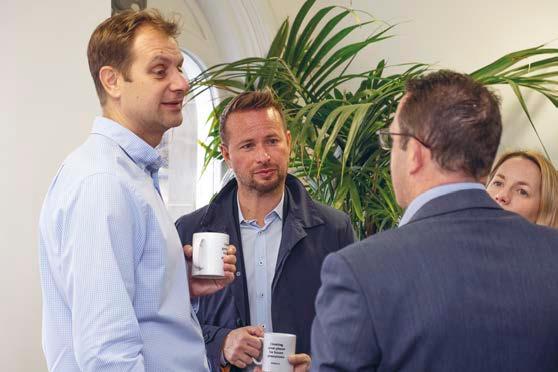
“But at the very local place level, for somewhere to be liveable, there has to be investment in that local economy to create a sustainable jobs market.
For all the opportunity, and initial cash boost for some areas, there nevertheless remain a number of obstacles to clear if the North East is to truly benefit from the Government’s flagship regeneration policy.
And the panel was united that a stream of high-value jobs, alongside a conveyor belt of talent, sit central to any future success.
John Seager, director at Broadoak Asset Management, highlighted a paper by Centre for Cities’ Paul Swinney, which uses Sunderland car maker Nissan as an employment and investment case study.
Noting the difference in stature of roles across the Qashqai and all-electric Leaf maker’s Washington production line workforce to that of a southern-based research and development centre, John said: “Nissan has access to cheap labour and land in the North East.
“But all of its higher value jobs are in Bedfordshire, where it pays a premium to be.
“The key to ‘levelling-up’ is making sure Nissan employs all those highly-skilled people in the North East.

“Until we have reached that point, ‘levelling-up’ won’t mean anything.”
Jonathan Wallace agreed, saying it was crucial the North East develops a stronger private sector base to underpin growth at the upper end of the employment spectrum.
55
WHAT ARE THE MAIN CHALLENGES TO MAKING ‘LEVELLING-UP’ A SUCCESS?
Roundtable: Towns and cities regeneration
“Is there an interface between education and business?
“I see a real opportunity, through ‘levelling-up’, for our region to have a body that matches students with industry”
–
“That employment has to be accessible, and support a local financial services sector, a doctors’ surgery and the rest of the foundational economy that makes a town work.”
Access to skills was another key area emphasised.
Jonathan Combe, partner and head of real estate at law firm Muckle LLP, said the region must do more to plug a ‘brain drain’ of academic talent.
He said: “We have fantastic universities, but what percentage of graduates stay in the region?
“We need to keep them, and things like the Treasury coming to Darlington could really create some momentum around jobs.”
encourages youngsters from a variety of backgrounds to consider the legal profession - while recalling his own school’s careers advice.
He said: “Inspiring Careers aims to give children from lower social backgrounds access to connections they don’t presently have, and there needs to be more of that kind of link.
“I went to a good school, but the careers advice was poor, and I worry in some that it hasn’t moved on.”
“‘Levelling-up’ has to start to help with mobility, by attracting people into things they may think they shouldn’t, couldn’t, or can’t be part of”
–Erin Peart
Members also discussed the existing educational framework, delivering a unanimous verdict that it presently fails to meet industry needs.
Acknowledging the pandemic’s impact on the world of teaching over the last two years, panellists nevertheless said action is of paramount importance.
Stephen said: “Links between education, schools and employment need to be forged much earlier.
“We deliver NE1 CAN, which provides a programme of engagement and events that plugs 1400 businesses into schools.
“But, as a region, we should have a far more integrated strategy between schools and employment.”
Jonathan Combe agreed, highlighting the company’s Inspiring Careers programme - which
Gordon Hewling, regional managing director at real estate firm Avison Young, concurred, saying he was concerned about the pressures placed on schools and education providers to deliver work experience and placements.

He said: “It’s a logistical challenge. If you’ve got 100 students in a comprehensive school, where are they going to go, and who organises that?
“And if there aren’t opportunities on the doorstep, even a week somewhere, you’re going to perpetuate the feeling of a glass ceiling, because students are going to go where mum, dad or uncle works.”
Against this backdrop, panellists used further examples of organisations’ talent pathways to debate the region’s commitment to creating a pipeline of excellence.
Referring to Ryder Architecture’s PlanBEE programme, which prepares youngsters for careers across construction management and engineering roles, alongside Gateshead College and other
Erin Peart, second right, director of campus services for Northumbria University, speaks to fellow roundtable members.
Also pictured, from left to right, are Andrew Sugden, Gordon Hewling, John Duns, Stephen Patterson, Stuart Miller, Jonathan Wallace, Tony Fitzgerald, James Taylor, Jonathan Combe and John Seager
56
Neil McMillan
Roundtable: Towns and cities regeneration
partners, Ronnie said there was great opportunity to turbocharge learning and development through ‘levelling-up’.
He said: “One of the biggest issues we have is attracting talent into the industry.
“And we’ve taken the bull by the horns.
“PlanBEE welcomes students for a foundation year, which introduces them to the industry and allows them to spend time with quantity surveyors, contractors, engineers and architects.
“It is a route into the sector, from which they are nurtured and placed within industry.
“It is interesting to consider what we’ve done against what could potentially happen through devolution, and whether there could be a devolved education budget capable of responding to our region’s demands.”
Stuart drew attention to Newcastle Building Society’s financial advisor academy, which the mutual founded to support expansion while covering staff turnover and retirement, and its partnership with the Newcastle United Foundation, which he said is having a profoundly positive impact.
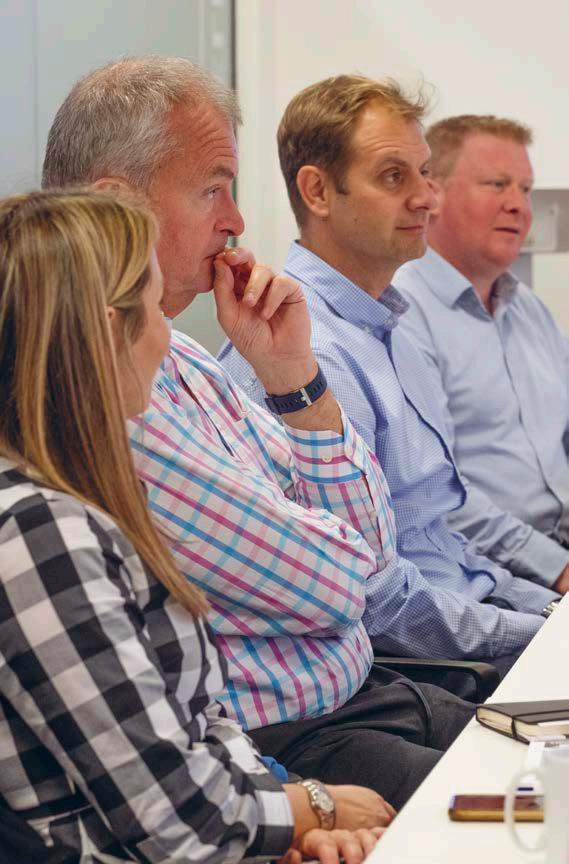
He said: “The academy has been a real success story, and our work with the foundation really gets children engaged.
“We do joint sessions, with branch managers focusing on things like career opportunities and the workday experience.”
Neil took the discussion forward, suggesting ‘levelling-up’ could create a new conduit for talent progression by creating a skills-based body capable of better coalescing industry and education.
He said: “Is there an interface between education and business?
“Because, I suspect, if you asked a lot of people in education what construction is, for example, they would view it as muddy boots and working in the rain.
“But the breadth of professions in the sector is phenomenal.
“I see a real opportunity, through ‘levelling-up’, for our region to have a body that matches students with industry.”
Neil’s call was given added colour by Tony, who revealed BAM Construct UK is evolving its recruitment process to remain at the forefront of sector developments while removing stereotypes.
He said: “The world is changing; modern methods of construction are a classic example, with everything made off-site in a clean environment.
“And within that landscape, we’re creating an adaptive workforce for the future, bringing people in that don’t necessarily have a focus on construction,
but who have strong digital skills, for example, which is bringing new ideas and ways of working.”
Erin said ‘levelling-up’ must too create a platform to remove a marked gender and inclusivity divide.
Citing her role as chair of the Royal Institution of Chartered Surveyors’ regional board, she said: “In the last 15 years, accountancy has shifted to a 50/50 gender split, and the legal sector has more females than males.
“But in the property industry, we are missing a whole generation, because we are not including or attracting BAME and greater diversity.
“It’s a UK-wide problem, and ‘levelling-up’ has to start to help some of that mobility, by attracting people into things they may think they shouldn’t, couldn’t, or can’t be part of.”
57
Roundtable: Towns and cities regeneration
Pictured, from left to right, are roundtable panel members Erin Peart, Jonathan Combe, John Seager and Ronnie Graham
Jonathan Combe backed Erin’s point, spotlighting the gender landscape within which Muckle operates.
He said: “You’ve got to inspire people that there is a career for them.
“We get hundreds of applications for apprentices and training contracts every year, and women perform much better at those interviews.
“Thankfully, we don’t have a gender imbalance, but the sector generally needs to find a way to attract more women.”
Jonathan Wallace said: “We’d be stronger as a region with greater diversity; if you look around, we have to move a little quicker.”
Gordon added: “Our industry is desperate to broaden the social spectrum.
“There is definitely a glass ceiling for anyone from a lower social background.”
COULD THE NORTH EAST’S ‘LEVELLING-UP’ AMBITIONS BE STYMIED BY SUB-REGIONAL DIVIDES? SHOULD IT BE SPEAKING WITH A MORE UNITED VOICE?
For all its collective title, the region has felt, for a while now, somewhat fractured, with elected mayors in the Tees Valley and North of Tyne bookending the so-called LA7 local authorities of Durham, Gateshead, Newcastle, Northumberland, Sunderland and North and South Tyneside.
However, with the recent Autumn Statement confirming the Government is “in advanced discussions on a mayoral devolution deal in the North East”, hopes
are increasing that those breaks may be healing.
And the panel was decisive in its belief that for any ‘levelling-up’ policy to work, the area must create a united front.
Jonathan Wallace said: “We need to improve at working as one region.
“We all benefit by having a company like Nissan in the North East, or if something happens in Newcastle.
“When I was a child, the North East started in Teesside and went up to Northumberland.
“But now there’s a feeling it begins in Durham and goes up, and that Teesside is a different entity.
“I remember the ‘passionate people, passionate places’ slogan of One North East - and the underlying reasons for creating that remain today.
“There is a real opportunity, and we must come together and bring it forward.”
John agreed, referencing work with the New Writing North charity and a piece by Richard Benson, which celebrates the North East’s history and problem-solving attitude, which he said the region must continue harnessing - as one - to succeed.
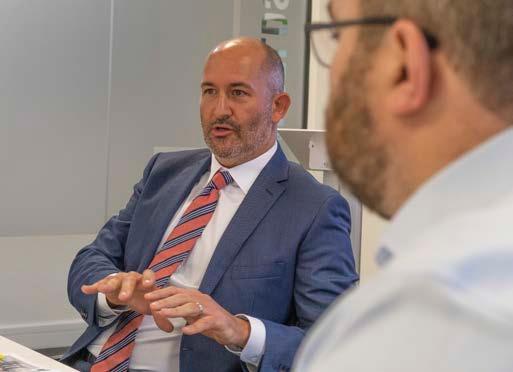
Neil said such a collective approach would help with the future presentation and investment value of the North East.
He added: “I always think of the region as one entity.
“We’re in a global race, and the world doesn’t see the sub-divides. It sees one North East.
“So why shouldn’t we?”
WHAT IS YOUR ONE PRIORITY FOR THE ‘LEVELLING-UP’ AGENDA ACROSS THE REGION?
Perhaps fittingly, for the cradle of the railway, both Tony and James called for improvements to train travel, which they said would dramatically increase passenger and freight services.
Tony cited the Northern Powerhouse Rail projectnamechecked by the Chancellor during the Autumn Statement - which aims to improve connectivity between the North East, North West and Yorkshire.
He said: “This would probably make the biggest difference to improving infrastructure, networks and connecting towns.
“It would really drive economic growth, and make a bigger difference than any individual project funded by ‘levelling-up’ cash.”
James highlighted the growing campaign to restore the 21-mile Leamside line, which runs between Tursdale,
58
“There is so much untapped potential in our region. And now is the time for us to exploit the many opportunities before us”
–
Jonathan Combe
Roundtable: Towns and cities regeneration
Neil McMillan, left, speaks during the roundtable event, watched by Andrew Sugden
in County Durham, and Pelaw, in Gateshead, but has been mothballed for decades.
He said: “We know the East Coast Main Line is congested.
“We want to run more freight on the line, but we can’t because it is heavily passenger serviced, and those services drive a lot of income.
“The Leamside line would go up via Washington and allow all the conurbations to the east of Newcastle to be opened up, creating viable commuting services in both directions while allowing for more freight that could link to the East Coast Main Line.
“The knock-on benefits would be enormous for a number of sectors.”
Andrew, Ronnie and Gordon championed expansion of the area’s green energy space, saying building
on developments such as Equinor’s Port of Tynebased Dogger Bank wind farm maintenance hub and Teesworks’ BP-led Net Zero Teesside Power project, which promises a gas-fired power station with carbon capture and storage capabilities, is a must.
Andrew said: “We sometimes overlook the region’s net-zero credentials, whether they be the Net Zero Industry Innovation Centre at Teesside University, the new Green Lithium factory on Teesside, the development of more eco-homes, the mine water heating scheme proposed around Seaham and the whole wind power industry.
“They make for a unique offer, which runs right back to our history of mining.”
Ronnie agreed, saying he believed it was important to continue strengthening the region’s port infrastructure amid a revision of international shipping routes.
He said: “Global trade movement is going to change so significantly over the next 20 to 30 years.
“There will be less demand on the Suez Canal, which is going to put more emphasis on the eastern coast and the ports.”
Gordon said: “Low-carbon measures run all the way up the seaboard - the new quay at Teesworks, for example, opens up much potential.
“And we have the best opportunity of any country in the world when it comes to offshore wind power.”
Jonathan Combe added: “There is so much untapped potential in our region.
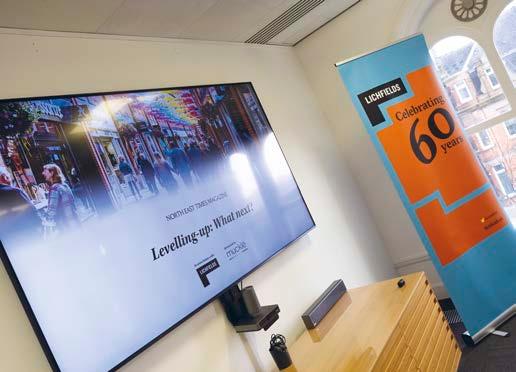

“And now is the time for us to exploit the many opportunities before us.”
“‘Levelling-up’ means the Government now has a regular stream of funds the city can pitch for. But the criteria has been hugely biased to London and the South East, which has sucked funding away from the rest of the country.
“And that is why I don’t think we’re quite there when it comes to ‘levelling-up’”
59
Roundtable: Towns and cities regeneration
–Stephen Patterson
The roundtable event assessed the progress of Westminster’s flagship equalising strategy through the eyes and minds of regional business leaders from a number of industries and sectors
Jackson Hogg festive drinks
Specialist recruitment and outsourced people services partner Jackson Hogg welcomed more than 100 guests and friends to Above Newcastle for a festive gathering to celebrate







Chief executive Richard Hogg [pictured, opposite page, top left] gave a short speech, during which he thanked the company’s many valued partners and supporters, who continue to help strengthen its industry standing.

He also spotlighted the firm’s evolution, with the business having recently moved into Wallsend’s Cobalt Business Exchange, to cater for ongoing workforce expansion, and switched to a four-day week while retaining full staff pay.
The event was held in association with North East Times Magazine.
60 Event_ Jackson
drinks
Hogg festive
its achievements during 2022.




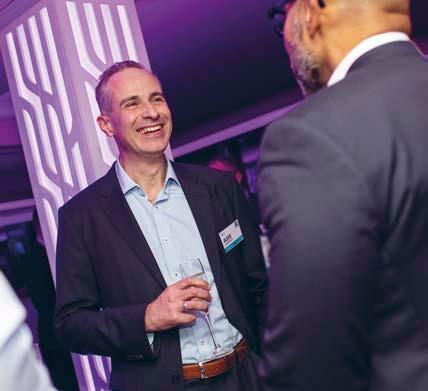




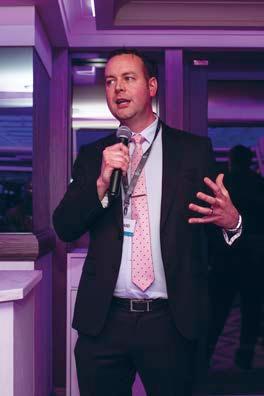

61 Event_
drinks
Jackson Hogg festive
Built Environment_
Advertising feature_Business Durham
The region’s largest industrial park just got bigger
County Durham’s commercial environment has expanded after work was completed on units at Newton Aycliffe’s Station Place. Here, Business Durham, the business support service of Durham County Council, highlights the economic and employment potential of the development.
www.businessdurham.co.uk
@_BusinessDurham
Business Durham -
To find out more about Station Place or book a viewing, visit www.stationplace. co.uk
To learn more about the work of Business Durham, and how it could help your organisation, visit www. businessdurham. co.uk
Work on a £4.8 million County Durham industrial scheme that will create more than 130 jobs is now complete and ready for tenants to move in.
Ten industrial units at Station Place, in Newton Aycliffe, have been built, representing more than 50,500sq ft of space.
Designed to support new and expanding businesses, the units vary in size up to 8700sq ft, and are available for occupation immediately.
Station Place is part of the wider £90 million Merchant Park industrial scheme – a 65-acre development at Aycliffe Business Park, located off junction 59 of the A1(M).
The park is home to more than 500 companies employing around 10,000 people, including international firms such as Hitachi Rail, Husqvarna, 3M, Gestamp and Lidl.
As the biggest single employment area in the North East, and one of the largest business parks in the UK, Aycliffe Business Park is a strategically important site for economic development within County Durham and the wider North East.
Durham County Council has agreed a 35-year-lease to support the development of the industrial units.
Managed by Business Durham, the business support service of the council, the units are part of its extensive industrial property portfolio.
The development was delivered in partnership with Merchant Anglo and Rokeby Developments.
Businesses taking up the units will benefit from the convenience of being in a newly-built facility.
In addition, all units have a ‘B’ energy efficiency rating, so businesses can enjoy lower utility bills and reduced maintenance costs.
There is also capability to install electric car charging points and superfast fibre optic broadband within all units.
Councillor James Rowlandson, cabinet member for resources, investment and assets at Durham County
Council, says: “We’re thrilled to see the development of Station Place come to fruition.
“It will add much needed growth space to this strategically important hub, and bring genuine added value to the regional economy.
“Our Business Durham team looks forward to welcoming new tenants to the units and supporting their growth.
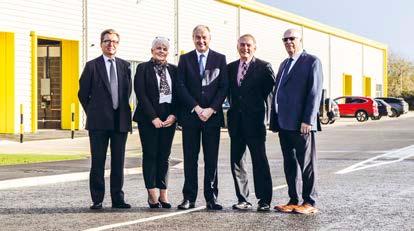
“Station Place is part of Durham County Council’s £2 billion programme of investment, either planned or underway, and our ambitious ten-year economic strategy, which is helping make the county an ideal location for investment and development.”
Geoff Hunton, director at Merchant Anglo, says: “Demand for quality industrial property has remained high in the area, with a renewed focus on expansion and the need to future-proof supply chains in the postpandemic era.
“There’s also continued high demand due to changes in the market caused by COVID-19, growing online demand and Brexit.”
Adrian Goodhall, of Rokeby Developments, the development manager for Merchant Anglo, adds: “In addition to having fantastic access to key road, rail, air and sea links, businesses at Station Place will be part of a thriving employment hub that caters for a wide variety of industries.
“We expect to see strong demand for these highquality units.”
62

The importance of pension planning
With a new year comes fresh resolutions, and as the 2023 calendar begins, and the start of another financial year looms, now is the perfect time to ensure your pension plans are in order. Here, Trevor Clark, Chartered financial planner and director at Perspective (North East) Ltd, talks Steven Hugill through the important areas to consider when looking to make the most of your retirement funds while laying the foundations for a lasting legacy.
www.pfgl.co.uk
@perspectivefgl
Can I pass my pension on in a tax-free manner?
Most people want to leave their assets to their children or other loved ones, and passing on a pension plan can be one of the most tax-efficient ways of doing so.

This is because pension savings aren’t normally considered part of an estate, so they could be exempt from inheritance tax, depending on personal circumstances.
Does my pension offer death benefits?
A death benefit, as the title suggests, is the money paid out after you die.
Most modern pensions allow you to nominate whoever you want to inherit your savings, and they’ll give a range of options to those who benefit.
Not all pensions, however, are the same.
For example, most annuities (a guaranteed income for life) will stop paying income when you die, and you won’t be able to pass it on, unless it is on a joint life
basis or has a guarantee period.
If your current pension plan doesn't offer the death benefits flexibility you'd like, you might have the option to transfer it to a different type of plan, or even another provider.
But not all plans will allow this, and transferring won't be right for everyone.
Ensure a beneficiary nomination form reflects your wishes
Everyone should make a will and keep it regularly updated.
However, what many people don't realise is that a will doesn't usually control who inherits your pension savings.
It’s your pension provider, or trustees, that will ultimately decide where your pension savings go.
They will take into account your wishes, if you have specified the people or causes you want to receive it, but they aren’t bound by them.
So you should make sure your intended beneficiaries are clearly identified.
You may need to request a beneficiary nomination form, from your pension provider, to do so. Or you may be able to name and update beneficiaries online.
Regularly review beneficiaries
Wishes and plans change, especially after big life events such as the birth of children and grandchildren, marriages and divorces.
And some beneficiaries may predecease you.
So it is imperative you update your pension plans as your circumstances change.
If you don’t, you risk your pension savings not going to the right people.
64 Finance_ Advertising feature_Perspective Financial Group
Consider the tax implications
Pensions can be a tax-efficient way of passing on your wealth because they aren't part of your taxable estate, so inheritance tax doesn't usually apply.

But other taxes, such as income tax, may apply.
If you die before 75, your beneficiaries will normally inherit your pension pot tax-free.
However, if you die after 75, your beneficiaries may pay income tax on anything they withdraw from your pension savings, depending on their own financial circumstances.
Remember the lifetime allowance position
Your pension lifetime allowance position refers to the limit applied on the amount you can build in your pensions over your lifetime.
It stands at £1,073,100 for the 2022/2023 tax year, and is frozen at this amount until April 2026.
If you die before 75, any pension you haven’t already accessed will be tested against your lifetime allowance.
If you’re over the limit, a tax charge will need to be paid on the amount over the allowance.
Perspective Financial Group -

Operating from more than 20 bases across the UK, including Newcastle and Darlington, Perspective’s local offices provide financial planning advice on matters including retirement, laterlife and long-term care planning, inheritance tax, investments and protection and corporate planning.
If you would like to speak to a member of the Perspective team about your pension plan, or discuss another aspect of your financial portfolio, call 0191 217 3340 or 01325 289400.
The landscape is complex and changeable - seek advice
Pensions remain an attractive way to invest and can help minimise your tax liability, but the rules around them are complex.
Therefore, it is imperative you speak to a financial planner to discuss the various options open to you.
The amount of tax that needs to be paid on your pension savings will depend on your individual circumstances and those of your beneficiaries, including the type of pension you have. Tax and legislation may change, and your circumstances - including where you live in the UK - will have an impact on your tax treatment.
And it is important to remember that a pension is a long-term investment, and that a fund value may fluctuate, which would have an impact on the level of benefits available.

65
Finance_ Advertising feature_Perspective Financial Group
WAXING
LYRICAL


66
A new product set to revolutionise our reliance on plastic is being quietly developed in a small house garage in a remote County Durham village. Rosie Bath only started experimenting and creating household items using wax cotton - which has been around for more than 500 years - in 2021. She registered her company Cera Cotton in the October of that year and quickly started producing a range of items for the home, using her own refreshing and inspired designs. She picked up the high growth accolade at last June’s Startup Awards North East and, within days of celebrating her 27th birthday, packed her bags in London and returned to the region. And orders for her plastic-free wax cotton items have been flying out ever since. Here, Colin Young meets Rosie to hear how her journey is progressing.
4 Rosie Bath is never happier than when she's sitting at her sewing machine in her parents' garage in Durham.
And it has certainly seen plenty of action over the last few years.
Designing, experimenting and producing new sustainable houseware items using a 500-year-old fabric, Rosie has been busy revolutionising products we’ve so long taken for granted.
She's working with a better sewing machine now - and on a 'nice big table'far removed from the tiny bedroom in a house she once shared with six others.
This, though, was where the Cera Cotton revolution began.
Thanks to an idea on the set of a Hollywood blockbuster - and the small matter of a major entrepreneurial award - Rosie is now back on familiar territory in the North East, preparing to take on the world and its reliance on plastic.
She says: "My aim is to become the home of wax cotton.
"I want it to be a viable alternative to plastic in household products.
"I want to expand my range, make more products, sell more wholesale and do more pop-ups.
“I had one at Boots, in Eldon Square, recently, and I absolutely loved it.
"You can't show people how effective it is online, but I have a little watering can with me to show how water resistant it is, and people love it.
“It was great to have that customer interaction."
Four years ago, after she'd graduated in fashion, design and marketing from Northumbria University, Burnopfieldborn Rosie could not have believed she would be on the brink of changing all our consumer needs with a 'new' product, which has actually been around for centuries.
She left for London to find work in 2018, and admits she didn't have much of a plan when she first headed south.
Rosie says: "I knew I wanted to do something creative.
"I interned in fashion, but it was very computer-orientated and I'm very hands-on; I like the sewing and practical element.
"I went to London because I didn't have a plan.
“My second cousin worked in film and TV, and she suggested I worked on this really tiny production, a short film
for a charitable cause.
“The crew was made up of volunteers, I worked on costumes for three days, and fell in love with it.
"I didn't even know the role existed; coming from the North East, it’s so far away - it’s London, someone else does that job. I went to a comprehensive school in Blaydon, and that’s not what you do.
"I remember coming home and telling my dad my choices for sixth form - more creative rather than maths and science - and his jaw hit the floor.
"It was a real eye-opener. I knew I wanted to work in film."
After working as a costume maker on the set of the ITV period drama Sanditon, Rosie was advised to take a ScreenSkills course, which opened up the world of big film productions.
If you have seen No Time To Die, Tom And Jerry, Jurassic or Midnight Sky, you will have seen her work.
"It all sounds very glamorous working on a film, and even though it can be an incredibly rewarding career, for the most part, it isn’t really glamorous at all.
"They did have a crew screening at the end of a job I’d worked on, and I
ROSIE BATH; CERA
67 FEATURE
COTTON
Words by Colin Young Photography by Christopher Owens

68
took my dad - as my plus one - who absolutely loved it.
“He kept telling everyone he was going to the premiere, but the film had already been released when we went.
"You don’t get to see a lot of the films until years later and, by the time you do, you've forgotten what you made.
“But I loved it; it was an amazing experience.
“One minute you're making something for the present day then, on the next job, you’re making in the style of the 17th century.
“I found that really interesting - you don't get that from a fashion job.
"Of course, you're not rubbing shoulders with A-list celebrities on set every day, but I wasn't in it for that.
“It was always about the costume making."
As much as she was living the dream, though, working as a freelancer on sets across the country, often for weeks at a time, did take its toll on the former St Thomas More School pupil.
She says: "I got to where I wanted to be because I got a costume maker role.
“But I just wanted," she pauses, "more..."
She adds: "I wanted to understand the process of setting up a company.
“Seeing through an idea from conception to sale is an exciting process, especially when the products have a positive environmental impact.”
Inspiration came on a job when Rosie worked with wax cotton, which is traditionally, and famously, used in Barbour jackets.
Still working in the film industry, while living in her shared house, Rosie used her small bedroom as a base for the fledgling business - and her experiments on bunting, plant holders, washbags and toothbrush carriers.
"When I first started working with wax cotton, I thought, ‘I have this amazing water resistant and plastic-free fabric, what can I do with it?’
“I'd come home from work, stay up until two in the morning, and have all my fabric on one side of the bedroom.

“I then had to start putting things in my bed, because I had no room; I was literally lying next to fabric rolls every night.
“It was hard, but I loved it.
"It is one of the world's oldest performance fabrics, introduced
by the Scottish seafarers 500 years ago, and then companies like Barbour picked it up.
“But it hasn’t really been utilised for anything else; they only ever really made jackets from it, and the odd accessory.
"We are so reliant on plastic.
“It was only invented in 1907, and in the course of human history that isn't that long, but nearly everything is plasticsomething close to 70 per cent of household items have plastic in them.
"We've just grown so accustomed to it.
"Obviously, we now know how damaging it is, but I don't think recycling goes far enough and I don't think business is doing enough.
“It is time to turn off the tap.
"Most people have a plastic peg bag, and if everyone switched to a wax cotton peg bag, imagine how much plastic that would save.
“It does the same job, it’s water resistant and actually lasts longer.
"I had a camping trip coming up, and wanted to make some bunting, and wax was perfect because cotton gets all mouldy and soggy, and plastic flakes away.
69
"I've looked back; how did we live before plastic? Wax cotton, it kept people dry”
ROSIE BATH; CERA COTTON
“I realised there were endless opportunities that could be explored.
"You can only do so much as consumers; lots of people are trying, but I heard a comedian once say it’s like turning up to the aftermath of a hurricane with a dustpan and brush and asking, ‘can I do anything to help?’
"Business needs to change, and to start looking at other methods, other ways of packaging, and also looking back as well.
“I'm used to looking back through my costume work and how things used to be made and how people lived their lives.
"I've looked back; how did we live before plastic? Wax cotton, it kept people dry.”
Cera is the Latin name for wax.
"I just googled it," admits Rosie.
"But, like the product, no one was using it, so I registered it immediately."
Cera Cotton was recorded in October 2021, and Rosie made the decision to return to the North East and move back in with mum Anita, chief executive of the Bishop Bewick Catholic Education Trust, and dad Mike, a technology transfer manager at Durham University.
Rosie says: "We kicked out my mam’s car, and I moved into the garage.
"They have been really supportive, and I was very lucky to be able to move back home.
"It was a bit strange; a lot of my friends are getting married and having babies, and I had a really good career, which I did enjoy, but I wanted something else.
"I moved back because I knew I would get support from home and from the Northumbria University Graduate Enterprise Scheme, and although there would have probably been more opportunities in terms of the market, I wouldn't get that in London.
"If you have any sort of academic potential in the North East, people presume you're going to train to be a doctor or a lawyer, and I think it’s a shame; up here, creative careers are not for you, that’s for privately educated kids down south.
"It is changing. But I knew I had to do something, even if it meant working in London, to come back. I'm really pleased I have."
Today, when she's not tapping away at her sewing machine, Rosie can be found on the road to an increasing number of pop-up shops, or lost in thought in the woods.
She carries a trusty A5 notepad with her at all times - for the scribbles on innovations and ideas that only she can understand - and is happiest taking a break from the world
of creation - and frustration - by going for a walk, even if her bestie, Teddy the Westie, is no longer around to keep her company.
Rosie says: "He was 16, he was deaf and going blind, but he was happy as Larry.
"He was my little heart-throb, and I'm really grateful we got to spend his last few months together.
"If I ever feel frustrated - which happens a lot - I just go for a walk, probably talk to myself really quietly and try to find a solution.
“The number of times I've found a really simple solution just going for a walk is amazing.
"There are lots of product ideas I’m really excited about.
“I'm working with a cycling firm to produce new plasticfree accessories - and products for the younger market as well.
"The pop-up in Eldon Square was a real revelation.
“Young women, in particular, really like the product and the sustainability, which I honestly hadn't expected, so that is going to be exciting.

"I want to make it easier for people to switch everyday products, which is going to make a massive difference to the environment, and make them attractive too.
"I put a lot of work into the design because you want to make something people want to buy, and are also proud to have in their homes."
70
FEATURE
ROSIE BATH

71
Out-behave your competition in 2023
With challenges on the horizon for businesses in 2023, we’re all looking for ways to increase productivity and performance. Here, Laura Weaving, founder and chief executive at Duo Global Consulting, shares insight on a key area to have on your agenda – behaviour.
www.duoglobalconsulting.com @iamlauraelizabethw
Pictured, from left to right, are Sarah Callender, Duo Global Consulting chief operating officer, and Laura Weaving, the company's founder and chief executive

Why does behaviour matter?
In business and at work, we’ve all heard about outperforming our competition.
But how about out-behaving your competition?
Whether you’re part of a large business with a long-established strategy, or a growing organisation with ambitious plans, understanding human behaviour could be the key to elevating your business in 2023.
At Duo Global Consulting, we are experts in human behaviour and have developed our own signature
behavioural mapping tool.
Our methods have resulted in accelerated growth of more than £100 million for clients.
Behavioural insight allows you to understand people on a deeper level.
It goes beyond personality types, to indicate how individuals think, communicate and act, and gives you key insight into what motivates and drives them.
This level of understanding benefits a business because whatever you do, people are involved at each stage - employees, leadership teams, investors, vendors, customers and clients.
Understanding their behaviour is like a secret key to unlocking growth; it will help you motivate your team, influence your customers and solve business challenges.
Overall, behavioural understanding allows you to create a high performing, results-driven culture, without neglecting wellbeing.
Or, as we like to say, it allows you to out-behave your competition.
Solving 2023’s challenges with behavioural understanding
Coming into 2023, two of the biggest universal challenges for businesses to face are recruitment and retention.
In a candidate-led market, businesses must develop a high performing team, while keeping top talent, to deliver the results they need.
With the cost of hiring one person averaging anywhere from £30,000 to six figures, getting recruitment wrong is a costly mistake.
72
Business_
Advertising feature_Laura Weaving; Duo Global Consulting
During the recruitment process, more traditional methods of assessing skills and competencies do not give a complete reflection of how an individual will fit within your culture, or how they will perform against your expectations.
However, embedding behaviour into your recruitment strategy means you can recruit more intelligently and better predict the success of each person prior to hire.
Firstly, identifying the dominant behaviours needed to excel in a role and complete your team means you can craft a job description and person specification that speaks directly to your ideal candidate.
Then, using assessments and interview questions, which give an insight into a candidate’s dominant, natural behaviours, means you gain a true reflection of how a candidate will perform in the role, seeing beyond the smoke and mirrors of rehearsed interview responses to understand what truly motivates them.
Once you have recruited new people into your business, the next challenge is retaining them.
A crucial part of retention is effective change management.
While change is inevitable, successful change management is not.
We know from experience that keeping employees engaged during change can be one of the biggest hurdles for businesses to navigate.
Regardless of whether the change you are experiencing is forced due to factors outside of your control, such as the current economic climate, or planned, for example, through the launching of a new product or service, knowledge of your employees’ dominant change behaviours and motivations will help you successfully engage them with change.
Understanding the behavioural make-up of your team from a change perspective allows you to adapt your change management strategy, put necessary initiatives and training in place and create an environment where individuals and teams are aligned.
In turn, you achieve employees’ buy-in to retain high performers and embed the change for long-term success.
A tool for measuring and understanding behaviours
With an understanding of the importance and
applications of behavioural insight, how can you practically implement it in your business?
At Duo, we have developed a signature behaviour mapping tool: The Duo Behavioural Map.
The map uncovers eight key areas of behaviour, underpinned with 18 separate behavioural patterns.
It gives you a deep understanding of the behavioural make-up of anyone taking it, with an accompanying action-focused, simple to apply, set of recommendations and report.
What’s more, organisations can cut and layer their behavioural data in a number of ways - from individual insight to team or even company-wide behavioural overviews.
This means leaders gain a complete toolkit for communicating and leading, which is tailored to the dominant behaviours in their business for increased impact.
If you’re finding it difficult to recruit the right people for your team, have high turnover levels, struggle to engage employees with change, or can’t influence your prospects to convert to clients, then chances are you are missing behavioural indicators, which will help you turn all of these situations around.
Leading with a deeper behavioural insight will transform how your business operates and addresses challenges.
If you’re aiming to positively impact people, performance and profit in 2023, add out-behaving your competition to your objectives.
Duo Global Consulting
North East Times Magazine has partnered with Duo Global Consulting to offer readers an exclusive opportunity to gain a free trial of The Duo Behavioural Map, where you can get a behavioural profile for up to ten members of your team.

Contact Laura to gain your insights and elevate your team’s performance at laura@ duoglobalconsulting.com
For more information on The Duo Behavioural Map, and how behavioural understanding will elevate your business, visit www.duoglobalconsulting.com
Listen to Duo’s podcast Misbehave to hear further exploration of human behaviour in a business context.
Pictured, above, The Duo Behavioural Map
73
Business_
Advertising feature_Laura Weaving; Duo Global Consulting
Five minutes with…
Bola Abisogun has joined Newcastle-based digital construction operator

BIM Academy as digital
director. With a strong background in the sector, and a longstanding commitment to boosting diversity and inclusivity, he has joined a team of strategists, researchers and innovators who are aiming to meet the global challenges in digital asset information management. Here, he chats to Colin Young about what he hopes to bring to the role.
Bola Abisogun
4Welcome to the North East, Bola. Tell us a little bit about yourself… I am an extremely passionate professional within the construction industry, and my biggest inspiration is my mother Alhaja Sidikatu Abisogun, who has taught me to always serve others and observe patience in all that I do.
From a very young age, I was - and remain - a fan of LEGO, amassing one of the largest collections on Hackney’s Kingsmead Estate, where I was raised as a child.
I have always been interested in technology, and I absolutely love cars.
Having qualified as a Chartered surveyor in 1999, I was inspired in 2005 to become founder and chairman of DiverseCity Surveyors (DCS), a highly successful peer-to-peer network offering excellence and thought leadership from across the global, non-traditional talent pool.
The achievement with DCS, and my wider contribution to the profession, paved the way for me to become a fellow of the Royal Institution of Chartered Surveyors in 2014.
74
www.bimacademy.global @bimacademy
You have made significant contributions throughout your career to diversity and inclusion, for which you were awarded an OBE in 2019. What more can you tell us about your work in this area? My commitment to diversity, equality and inclusion was not curated by choice or design, more as a result of my lived experience in the construction sector and specifically the surveying profession.
My activity and achievements have come on the back of my relationship with the construction industry, but despite all I have gained, I still haven’t achieved my goals or end-game, and often describe myself as being a 4.5/10, in terms of realising my full potential.
That may appear a little harsh, but I know what is possible, and it is a large part of why I have beenand remain - committed to the diversity and inclusion conversation.
My drive is reflective of my knowledge in that.
When it comes down to it, most people just want the chance to improve themselves.
The creation of access to opportunity has become part of my DNA, and I suppose my passion is directly correlated to my lived experience and co-existence as a black professional in essentially what is still very much a white, male-dominated industry.
You began championing the benefits of building information modelling (BIM) in the construction industry 25 years ago. Do you feel there has been enough progress on BIM understanding and uptake during this time? What is still required to make construction truly digital?
I wrote my first ‘process level’ digital twin, using BIMenabled workflows, that deployed neural networks and hyperlinked expert systems, as part of my thesis in 1994.
Twenty two years, and with an overarching intention to deploy digital twins into ‘regulated professional services’ citing cultural change, I was invited - in October 2020 - to sit on the Gemini Council at the University of Cambridge’s Centre for Digital Built Britain (CDBB), and remain a co-author of both the Gemini Papers and the Digital Twin toolkit.
For those that may not know what a digital twin is, in construction terms, it is a virtual replica of a physical building, allowing us to see what it will look like before it is created.
The entire conversation about BIM has been largely misunderstood and essentially devalued, due to a lack of evidence-based ‘value creation’.
Understanding what BIM can offer is essential. It is
a process that introduces digital ways of working to modernise traditional construction methods.
I want to help change the focus of the construction industry, so more businesses adopt BIM and work with advanced technology to improve productivity.
You have joined BIM Academy to establish strong business links with UK and international clients. What are you planning to bring to the organisation?
As digital director, I have two key responsibilities.
The first is to bring to life my entire body of work following my 32-month sabbatical at CDBB, where I worked with some of the greatest minds across the UK (and in some cases, across the world) to deliver the National Digital Twin Programme.
Aligned to a pending, and now legal, requirement, under the UK Building Safety Act, which received Royal Assent in April 2022, I went on to develop a use case for deploying digital twins in social housing, in light of the Grenfell Tower disaster.
My second responsibility is to provide new grassroots career opportunities in the form of a Digital Twin Skills Academy.
This is focused on people aged between 16 and 25, who are seeking to learn new digital skills, and aims to bring them into the world of digital construction.
We know BIM Academy has its headquarters in the North East, but it works on projects all around the world. Can you tell us a little more about some of its catalogue?
Founded in 2011, BIM Academy has seen monumental growth, both in terms of people and revenue, increasing team size and turnover by 50 per cent in the past three years alone.
Such rapid growth has seen it become one of the most respected and trusted digital transformation specialists across the globe, guiding clients through digital strategies across the construction sector in no less than 20 countries.
With offices in Canada and Hong Kong, as well as the UK, our talented team of strategists, project managers, software developers, designers and researchers continue to expand globally, with recent contract wins in North America and the Middle East.
BIM Academy works with clients such as BMW, LEGO (much to my delight), Sydney Opera House and The Royal Household to support their transition to digital ways of working.
I have become part of an immensely talented team, and I look forward to fulfilling my ambitions with this incredible organisation, which has its roots firmly planted in the North East.
75
Nicola Leyden, Muckle LLP HR director, and Jason Wainwright, the firm’s managing partner, with its Investors in People plaque
Platinum reward for putting people first
Leading regional law firm for businesses Muckle LLP has been awarded platinum status by the internationally-recognised accreditation scheme Investors in People, placing it second in the world rankings of legal sector employers.
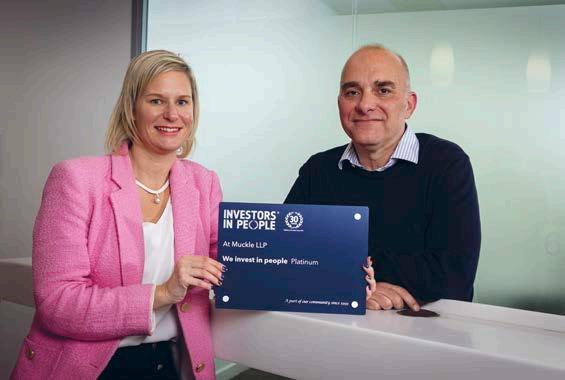
www.muckle-llp.com @MuckleLLP
For more than 30 years, Investors in People (IIP) has been recognised internationally as a leading people accreditation.
The organisation works with more than 50,000 organisations across 75 countries, and recognises those performing at the very highest levels of people management practice, with only three per cent of companies in its accredited network achieving platinum status.
performance management strategy, where corporate objectives are linked directly to each individual, led to 100 per cent of its people agreeing they understood their role in Muckle’s plans for the future.
Shared values
Survey results revealed 100 per cent of its people agreed they shared the firm’s values, and highlighted solid leadership as a strength.
The IIP assessor reported there was “clear evidence of strong leadership that was based on open and honest communications”, and praised the leadership team for modelling behaviours that bring to life the firm’s values of trust, teamwork, responsibility and care.
Jason Wainwright, managing partner, says: “We’re thrilled to achieve platinum accreditation.
“The award is only given to companies that truly look after their people, so to be placed second in the world in the legal activities sector and 69th overall worldwide is a huge achievement, and a credit to every single person working at Muckle.
“As a team, we focus on our four core values of trust, teamwork, responsibility and care.
“This approach has allowed us to create a peoplefocused environment, where our people are engaged and feel valued, delivering a high-quality experience to customers.
To achieve the accolade, companies must show continuous improvement over three years, making Muckle’s accreditation all the more impressive considering the difficulties of the pandemic in the preceding two years.
Muckle LLP surpassed both industry and IIP benchmarks for employee welfare, promoting initiatives that create a culture which allows people opportunities to reach their full potential.
The firm’s innovative continuous improvement and
“Every single person at Muckle is involved in supporting each other and doing their best to make work better, but we won’t be resting on our laurelsthere’s always something to learn, so we’re using the feedback received to keep making changes, keep improving and keep moving forward.”
People focused
Having previously achieved IIP gold award accreditation, the platinum honour indicates the firm’s
76
Law_ Advertising feature_Muckle LLP
continued commitment to leading, supporting and engaging its people.
Paul Devoy, IIP chief executive, says: “We’d like to congratulate Muckle.
“Platinum accreditation is a remarkable effort for any organisation, and it places Muckle in fine company with a select group of organisations that understand the value of people.”
In order to achieve the platinum award, companies need to meet at least seven of the nine indicators at the high-performance level, with Muckle receiving top scores in seven, with the other two still ranking as ‘above average’.
Leading and inspiring people, creating sustainable success and empowering and involving people were just three of the indicators highlighted to demonstrate the firm’s commitment to supporting people in developing their careers and the work undertaken connected to succession planning.
The report noted the firm had “invested in a wide range of development activities to the extent that learning had become an almost day-to-day activity”.
Commitment to the region
IIP also highlighted Muckle’s commitment to diversity and the local community, with the firm’s approach to ESG described as a “key feature of the business”, which provided “an authentic, ethical purpose that further connected people to Muckle and its leadership”.
Muckle donates one per cent of its annual profits to its Muckle Community Fund, and celebrated 20 years of giving in 2022.
-
For more information about Muckle LLP’s peoplefirst approach to business and associated accreditations, visit www. muckle-llp.com or call 0191 211 7777.
Pictured, above, Muckle’s team celebrates the firm’s Investors in People platinum status
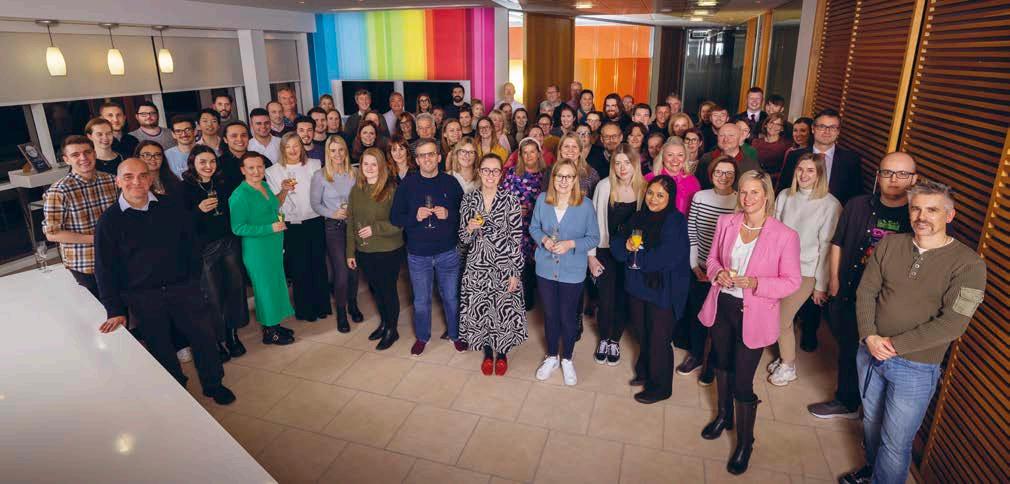
Since 2002, it has awarded more than £600,000 in grants to nearly 700 charities and organisations across the region.
The firm also gives its people two days of volunteering leave every year, and provides up to £140,000 worth of free legal advice to charities and community organisations every year.
IIP said Muckle’s sustainability and community scores are what they’d expect in a charity, not in a commercial law firm.
The platinum accreditation requires businesses to show continuous improvement against a wide-ranging framework over three years.
Assessors collected feedback from Muckle employees, reviewed documents and evaluation metrics, and held one-to-one sessions.
They gave a total score of 817, which is 89 above the average IIP benchmark and places the firm 69th of 50,000 organisations in the global network, and in the top two of all organisations in the legal activities sector taking part across 75 countries.
Jason adds: “I am extremely proud and privileged to be a part of such an amazing team, and I would like to thank everyone who took part in this assessment.
“Their hard work and dedication has been absolutely central to this achievement, despite the challenges faced in the last few years.
“Our people are our greatest asset, and without them and their continued commitment, we wouldn’t be able to provide the best possible service to clients.
“It’s so important we continue to invest in the development and wellbeing of our staff, to allow us to grow and develop.”
77
Law_
feature_Muckle LLP
Advertising
Muckle LLP
PROVIDING THE KNO-HOW ON NETWORKING
As the region’s largest and most influential multi-sector membership organisation, supporting more than 2000 businesses from SMEs to multinationals, the Chamber is a trusted business community with the largest business events programme in North East England. Since 1815 it’s been a force for good in the region, working to ensure members get the best possible support through comprehensive benefits like exclusive services, cost-savings, events and networking, knowledge and information, and policy representation and campaigning. To build on all of this, the Chamber has enlisted Jeni Smith, a networking expert and founder of NetKno, to help members overcome barriers to networking, understand the benefits of the process, and get the most from the events programme. Available only to Chamber members, the ten-minute Kno-How videos cover everything from the principles and power of networking, to improving your elevator pitch. Here, North East Times Magazine speaks to Jeni, to find out more about the series and how it supports members.

78
www.neechamber.co.uk @NEEChamber www.netkno.co.uk jeni@netkno.co.uk
Tell us a little about yourself
I’m a northerner passionate about networking.
I’ve been networking professionally for more than 16 years across the UK, including a stint as a full-time networker in Liverpool, founder of a network in Cumbria and managing director of a network in the North East.
I launched NetKno in March 2020, just as the world closed its doors, and since then have been on a mission to help people network more effectively, confidently and strategically.
As well as teaching networking skills and creating networking strategies, I’ve built a unique SaaS (software as a service) platform, which brings together all the networking events happening across the North East, so people never miss out on opportunities.
I’ve also recently started a PhD at Durham University Business School, researching the relationship between networking event anatomy and entrepreneurial narratives.
What’s the drive behind NetKno?
I came up with the idea for NetKno while on maternity leave three years ago, but it has been a long time in the making.
Ever since I discovered the world of networking in 2006, I’ve been hooked, and have repeatedly seen the impact it has on individuals and businesses.
During my time hosting and attending events, I created a kind of map in my mind of the world of events, and I used it to navigate opportunities and recommend events to others.
In 2017, I drew the ‘map’ (more of a doodle at the time) for some colleagues and was encouraged to explore it.
Durham University ended up conducting two rounds of academic research into it, which really spurred me to share it with the world.
NetKno comes from a place of wanting to help people network with purpose, to give them the tools and confidence they need through training, and the ability to strategically select the right events for them through consultancy and the SaaS platform.
What does the Kno-How series do for members?
In the post-lockdown period, a lot of people are out of practice when it comes to networking, or socialising in general, so the Chamber wanted to create a series of resources to help members develop networking skills and rebuild their confidence.


The series has been designed so members can jump
in and out of videos, learn in their own time and access resources when and where works for them, so they have complete control.
The Chamber offers such a variety of networking opportunities throughout the year, designed to add value to its members, and the purpose of this series is to give them the confidence and tools they need to take advantage of those opportunities – whether they’re a seasoned networker looking for a refresh, or someone who has never set foot in an event before.
The series is without doubt one of my proudest pieces of work to date.
Getting to work with the Chamber, which is so passionate about supporting its members, has been an absolute joy.
79
Campaign: North East England Chamber of Commerce and NetKno In collaboration with North East Times Magazine

80
How do you get the most value out of networking?
In a world obsessed with numbers, certainly when it comes to social media followers and web traffic, it is easy to get wrapped up with volume.
But in reality, less can be more.
If you can build and really nurture relationships with the people in your network, so they understand you and your business, that is much more powerful than having hundreds of people who have no idea about you or what you do.
The greatest way to get value out of networking is to give it.
When you add value to the people in your network, through things like introductions, knowledge transfer, support and mentorship, the more value you get back in return.
What three ice-breakers would you suggest for a networking novice?

The first top tip is to stand by the bar, buffet or coffee –that’s where people congregate, so you’ll easily spark up a conversation passing someone the milk or discussing the quality of the biscuit selection.
The second is to put your phone away.
I know networking can be awkward, and if you find yourself stood on your own, your phone can be a safety blanket.
However, by getting your phone out, you’re simply prolonging the time in which you’ll be stood on your own, because nobody will come and talk to you.
And the third is to say, ‘hello!’
Remember, everyone has signed up to be at a networking event – they want to talk to you.
It’s not like you’re walking up to someone in the supermarket and asking what they do for a living. You’re in a networking event, where social etiquette not only allows you to talk to people, but requires it.
So take a deep breath, smile and start with ‘hello…’
“Knowing what you want from networking is key.
“You can start working on this before you go to any events. It’s important to take some time out to think about what you want to achieve and who could potentially help you ensure you get the most from every opportunity.
“Don’t forget to help others; this will mean they are more likely to remember you and recommend you.”
Rycroft, director - membership


“Meeting someone at a networking event is just the first step to building your network – more of the real networking happens afterwards.
“Be sure to connect on social media and personalise any messages you send.
“Look for ways to add value to your contact.
“Providing support when needed, engaging on social media and sharing knowledge are all fantastic ways of nurturing new and existing relationships.”
“My tip is to network often. Attending a one-off event is not going to help your business overnight.
“To get the most from networking, consistency is key. Attend lots of events, chat and get to know people. It’s not all about sales!
“If you see someone on their own, go over and say, ‘hello’.
“Being nice goes a long way in the networking world, and can help build meaningful connections and lasting business relationships.”
81
Campaign: North East England Chamber of Commerce and NetKno In collaboration with North East Times Magazine
Daniel Marsden-Knight, head of marketing, communications and events
Jennifer
John McCabe, chief executive
Chamber in numbers: 200+ events and webinars planned for 2023 9500+ attendees at events and webinars in 2022 40,000+ people to connect with across our online community £138,600 of business services and cost-savings accessed by members in 2022
The
Taking innovation to the root: Vertical farming
Innovation and diversification are rooted in the success of Plastic Mouldings Northern Ltd, the Bishop Auckland-based industry leader whose main output is the production of vacuum formed plastic parts on a regional, national and international scale.

www.pmn-ltd.co.uk @pmn_ltd
The ethos at the heart of Plastic Mouldings Northern is ‘we never stand still’.
And the industry innovator has benefited from high growth by leveraging its collaborative and innovative capabilities, alongside assessing new market opportunities.
Its recent foray into a new and diverse sector has seen it collaborate with dynamic and forward-thinking horticultural engineering specialists in producing hydroponic trays (a vital piece of equipment for sustainable growth systems) for one of the UK’s largest vertical farms.
Vertical farming is one of the most innovative solutions for lowering the amount of energy, space and water needed to grow food.
-
Plastic Mouldings Northern
For more information about Plastic Mouldings Northern, visit www.pmn-ltd. co.uk or call 01388 777700.
Using the latest hydroponic systems and LED technology, crops are grown year-round in a perfect, pesticide-free environment using 100 per cent renewable energy.

Thanks to a controlled environment, each tiny leaf tastes as good as the last, with greens unaffected by the weather and seasonal changes.
And thanks to prime urban locations unseen in farming before, there is no need to import crops.
Freddy Bourdais, Plastic Mouldings Northern co-founder, says: “We’ve successfully supported the delivery of a fully operational and automated facility, taking the practice to a whole new level.
“This has resulted in the ultimate climate-controlled grow system.”
82
Manufacturing_ Advertising feature_ Plastic Mouldings Northern

OF IDENTITY

84 A NEW KIND
fhill@brookings.edu www.brookings.edu
Dr Fiona Hill went from the coalfields of County Durham to the corridors of US power. A miner’s daughter turned renowned Russia expert, she acted as a top security advisor to presidents Donald Trump, Barack Obama and George W Bush. Here, she tells Steven Hugill about her career journey, how the chaos of the US’ 45th leader left her feeling like Alice in Wonderland, and how she sees parallels behind Putin’s desperate search for identity in Ukraine and the childhood landscape her father urged her to leave behind.

4“The best preparation I had for working with Donald Trump was reading Alice’s Adventures in Wonderland, and Through the Looking-Glass, because every day was like the Mad Hatter’s Tea Party.
“We went in trying to think about a larger strategic purpose, but it just became a job of putting out fires all the time.
“I felt like my grandad, who was an air raid warden in Billingham during the Second World War, and went around sticking incendiary devices into a bucket of sand before the bombers came over.”
Dr Fiona Hill gives a half smile, the incredulity of Trump’s tyrannical reign too much to suppress.
As the tycoon-turned-politician’s deputy assistant and top Russia advisor, County Durham-born Fiona operated as an integral part of the White House’s inner power circle.
A former senior director for European and Russian affairs on the US’ National Security Council, she added colour to the country’s place within an ever-evolving geopolitical picture - all while trying to keep its firebrand leader in check.
A miner’s daughter, Fiona never cleaved the coal that helped spur the North East’s status as an industrial hotbed.
She did, though, inherit the spirit of the region’s underground endeavours, one lit by a torch of identity and community.
85
Words by Steven Hugill
Photography by Christopher Owens
And when she was thrust into the spotlight as a key witness in Trump’s first impeachment trial - based on allegations he abused power and obstructed Congress - the former Bishop Barrington School pupil channelled that fire, peering through the lens of her past to help the US look beyond its 45th president’s anarchic reign.
She says: “When you’re brought up in an environment where everyone helps everyone else, where there is a real sense of community and a real sense of public service, you are taught to stand up for what is right.
“If your house is on fire, you need to do something - and America’s house was on fire.
“I saw people about to destroy a country, and I wasn’t going to let it happen,” adds Fiona, whose testimony led to the creation of a Twitter page by supporters, which now has nearly 2000 followers.
Taking on Trump, of course, meant staring down the combative lawmaker, as well as his Republican allies and his
baying mob of supporters.
Not that Fiona - who also served as a security advisor to US leaders Barack Obama and George W Bush - was intimidated.
She says: “Trump was an enormously flawed personality, and the whole presidency was a tragedy - there wasn’t any capacity to build something.
“I joined the administration to focus on Russia - I’ve tracked the country very closely since the 1980s - but quickly realised Trump’s negative impact on the US and its international affairs was having an impact elsewhere.
“And I found myself trying to contain the damage.
“As trial witnesses, we were attacked for being deep state coup-plotting bureaucrats, and our patriotism and sense of public service was challenged because we were naturalised citizens.
“But I wasn’t having that.
“Being from the North, sometimes people just get your back up, and I said, ‘don’t try that with me’.
“Most of the people I’ve worked with
in government have come from humble backgrounds, and have wanted to serve their country and work with other people on a shared sense of mission.
“Growing up in County Durham, I learned that when you worked down the mine, you stood up for each other, you worked for your marra, and if there was an accident, you left nobody behind.”
She adds: “You have to stand up for what is right, and the most important thing you can do in life is tell the truth - it can be a powerful act when everyone around is telling a pack of lies.
“And I told the truth about what I saw under Trump,” says Fiona, who returned to a senior fellow role at the Washingtonbased Brookings Institution think tank after leaving the National Security Council in 2019.
That she found herself caught in the tremors of such a seismic political period owes everything to Fiona’s upbringing.
As a child, she was too young to experience the heyday of Britain’s ‘black gold’ rush, instead witnessing the social and economic fractures left behind after
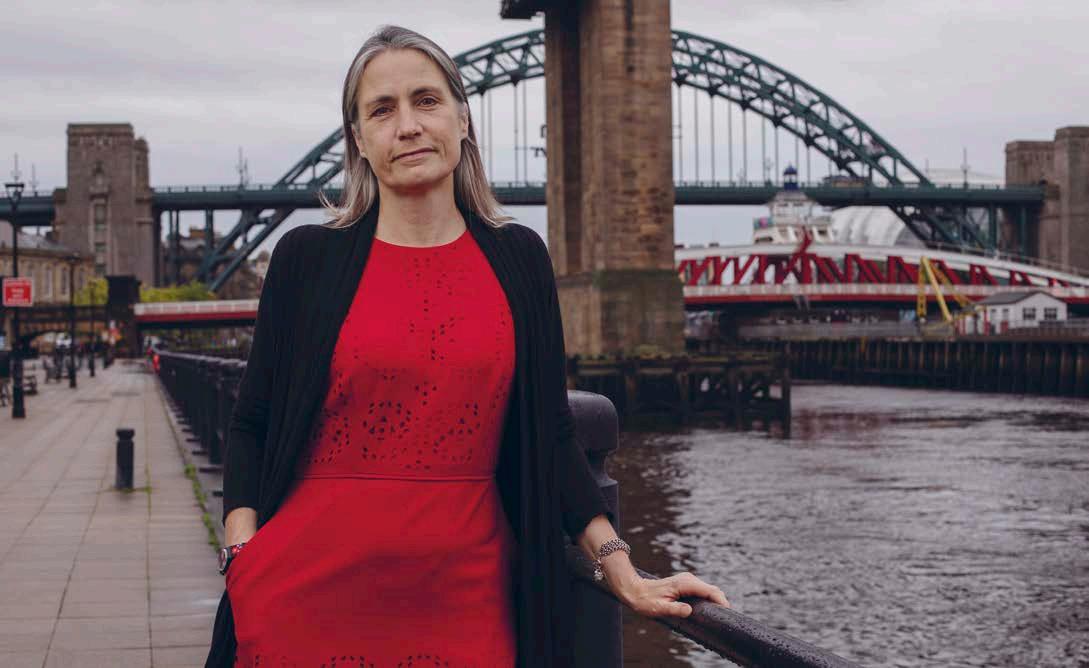
the headstocks had made their final turns.
Growing up in and around the once colliery heartland of Bishop Auckland, she saw towns and villages hollowed out, their inhabitants displaced and in dire search of meaning and worth.
She watched too as her father became an NHS porter (“every porter was a former miner; they didn’t know what else to do - there was no reskilling back then”), while others did what they could to survive, as centuries of industrial tradition crumbled.
The transposition sparked a curiosity in her, which began with family walks in the County Durham countryside, local landmarks filling the first spaces of what would become an enormous life jigsaw.
She says: “I’ve very fond memories of walking along what are now heritage trails with my mum, who worked as a nurse, pointing out what had been there before.
“We didn’t have a car, but there was always a sense of getting out and exploring the countryside; we had relatives all over the place, so would take the bus to see them.
“Growing up on the edge of Bishop Auckland, we’d regularly walk to Escomb, where there is a Saxon church from the seventh century, and I’d contemplate the nearby Roman fort, thinking about how people had been here for millennia.”
Those strolls set in motion a journey into academia, which would eventually wind its way to Washington.
Watching as the coalfields disappeared and Cold War tensions left the world on a nuclear knife-edge, Fiona saw education as an escape route.
And she was helped by a relation, who - half-jokingly - suggested she study Russian to understand the rapidlychanging world.
She says: “Places where my dad had grown up, like Crook and Roddymoor, and others like Sacriston and Brandon, were gutted; the industries that once brought a sense of knowing who you were had gone.
“After leaving the mines, he tried to get work elsewhere, going to a steelworks
and a brickworks, but they didn’t work out, so he went to work at the local hospital.
“My dad threw himself into work; there was a strong culture that you shouldn’t be getting a handout from the state.
“But all of this was now set against a backdrop of being uprooted, of losing a sense of identity and community.”
Fiona adds: “And I wanted to know why this Silicon Valley of its day had gone into a massive decline.
“It was starting that search for explanation that led me to where I am now.
“My great-uncle Charlie Crabtree had been in the merchant marine during the Second World War, and he couldn’t understand how we’d gone from being allies with the Soviet Union to enemies in such a short period of time.
“And with the 1983 war scare, and the backdrop of being pitted against the other great industrial power of the postWorld War Two period, I thought, ‘why not study Russia and figure it all out?
“Coming from a region that was heavily industrialised, I quickly realised the Soviet Union was a bigger version of the same thing - albeit with a very different ideological slant!
“The North East has a lot of links to the Soviet Union, which include some of the great writers of the Bolshevik revolution.
“Yevgeny Zamyatin - who wrote ‘We’, the precursor to Orwell’s 1984 - also wrote ‘Islanders’, which was based on his time in Newcastle’s shipyards.
“And the miners of County Durham were linked to the miners of Ukraine’s Donbas region too.
“The same industrialists that built the North East also built up the industries of Imperial Russia - and I became really interested in those ties.”
Fiona’s voyage of discovery was aided, in no small part, by time in the Soviet Union.
Having participated in a Moscow study programme, she was recruited by an American broadcaster to bolster its coverage of Mikhail Gorbachev and Ronald Reagan’s signing of the
87
FIONA HILL
Intermediate-Range Nuclear Forces (INF) Treaty in the late 1980s.
She says: “NBC News were looking for English speakers, and I got the opportunity to work as a stringer.
“I then met an American professor, who told me all about the fellowships to study at US universities.
“At that point, I knew I wanted to learn more about the Soviet Union, and I also thought I really ought to see what is happening in the US.
“I’d never been before, but my family had been somewhat obsessed with US culture, and we had a relation who’d married a GI during the Second World War.”
From those academic chats, Fiona embarked on Soviet studies and a doctorate in history at Harvard University, before holding a number of positions at the institution’s John F. Kennedy School of Government.
She served as national intelligence officer for Russia and Eurasia at The National Intelligence Council during the late 2000s, and more recently penned books on Vladimir Putin and US socioeconomics and the country’s similarities to modern Russia - the latter titled ‘There’s Nothing For You Here,’ a play on her father’s assessment of home as a child.
“I’ve gone full circle,” smiles Fiona. “I find myself talking more and more about that period in the 1980s.”
And like so much in her life, a great deal of those conversations centre upon identity.
She says: “During my experiences in the Trump administration, trying to explain why he was elected, I realised it was the story my family and I had lived through in the North East.
“It was all about de-industrialisation, the loss of place and identity, people looking for ways to turn back the clock, and having someone address their grievances and resentments.
“Watching Trump was like an exercise in social anthropology.
“His support base was very similar to Putin; it was people feeling like they’d lost their place in the world."
The latter’s quest to revise such apparent social and geographical displacement was further exposed last year, when Russia launched its assault on Ukraine.
Fiona, who previously took part in meetings with Putin, describes his attack as “nuclear blackmail” rooted in a desperate bid to overturn a century of history.
She says: “Putin has a big base of support from the old industrial areas of the Soviet Union, the Newcastle and coal mining equivalents, if you will, who are looking to him to turn things around.
“But he’s trying to revise 100 years, and the territorial dispositions from the dissolution of the Russian Empire.
“He talks about being a cornered rat, but he’s the one who pushed everyone in a corner.
“He’s doing what Kaiser Wilhelm and the Germans did in the First World War, and what Hitler did in the Second World War - and he’s trying to frighten everyone with the idea of a Third World War by returning to the nuclear horrors of the past."
Fiona adds: “He threatened Trump during the G20 Osaka summit, in 2019.
“When the US was pulling out of the INF Treaty, he said, ‘Remember the Euromissile Crisis and the Caribbean Crisis (Cuban Missile Crisis); we might come back to that’.
“But the US isn’t mobilising nuclear weapons.
“This is one country not liking the international order, and wanting to rupture it.
“But we shouldn’t be scared - we're not talking about absolute warfare.”
Nevertheless, Fiona says the world must look at Putin’s motives with great
seriousness, adding leaders and the global ruling community must quickly come to terms with how it contends with Russia’s offensive, in terms of the rhetoric and real-time ruin of a country, the ending of a world order and the fresh identity of another.
She says: “This is someone who uses whatever instruments he can - polonium, Novichok, assassinations, throwing people out of windows. The guy is ruthless.
“And he thought he’d found the best moment to strike in Ukraine, with the US having pulled out of Afghanistan, Angela Merkel’s era having ended in Germany, the French elections looming and the UK being at odds with its European neighbours.
“He’d told Estonian and Finnish leaders in the weeks leading up to the invasion that he’d bought off the West, and that nobody would do anything.
“He expected the Ukrainians would capitulate immediately, and that we’d crumble more widely too.
“But there was a realisation across Europe that this was like conflicts of the past, and that we couldn’t just stand by.”
Fiona adds: “It is a very different situation to what we had in the 1960s and 1980s.
“We had been engaging with Russia on strategic stability talks, and there was a lot of effort before he made the decision to invade, to find a solution to this.
“And we have to continue to engage in diplomacy, and push back against his framing.
“Everything is going to change - we’re already in a new world of economic warfare.
“We’re not going to be reliant on Russian energy any more, and we’re going to have to go through a lot of pain.
“But when you know what you’re up against, you must face your fears - like we have before - and prepare to deal with them, not scare yourself silly.”
88
fhill@brookings.edu www.brookings.edu

Sarah Ledger
Closing this month’s issue of North East Times Magazine, Sarah Ledger, chief executive at Middlesbrough-based Lexonik, reflects on the education firm’s recent National Literacy Trust acclaim, assesses the post-pandemic learning landscape and sets out why strong reading skills are fundamental to the North East fulfilling its ‘levelling-up’ ambitions.

4Lexonik was recently praised by the National Literacy Trust for significantly increasing learners’ reading ability and confidence, while also enhancing teachers’ capacity to support pupils. You must be immensely proud of such industry recognition?
Incredibly so.
We always knew the progress impact of our Lexonik Advance literacy programme, and of our delivery, but we wanted to validate that a second time.
School and college leaders, as well as teachers on the ground, need to trust in the interventions they are buying into - and ask to see external evaluations of impact to validate all progress data claims.
By inviting the National Literacy Trust to robustly research our approach and report on our work, we were absolutely putting ourselves out there for the rigours of the highest scrutiny in the sector.
We’re thrilled with what they concluded, and we’re proud to be able to share that with our colleagues, schools and communities.
4The COVID-19 pandemic severely disrupted youngsters’ progress on their respective learning pathways. Has the landscape begun to turn more favourably again, now lessons are once more being delivered in classrooms, or is there still an element of catching up to be done?
Teachers worked constantly throughout the pandemic, and continue to do so, to ensure students are reaching their potential in all areas.
But it’s certainly been a challenging period for the profession; when we’re in classrooms, and training
teachers about Lexonik Advance, we’re chatting to them all the time about how tough it has been.
But there is optimism for gaining ground.
In fact, you could say that it is in some ways because of the pandemic period, wherein some schools sought out solutions like ours, and recognised how effective our system is in speedily getting students to leapfrog their reading age.
Reading interventions must be seen as a ‘fire break’, a strategic, data-driven short period of time.
4You are a strong advocate of literacy being key to the North East’s ambitions of maximising its place within the Government’s ‘levelling-up’ agenda. Why do you think that, and does anything need to be done more widely to ensure skill levels rise? Reading is a basic human right; nobody should feel limited by their inability to read.
Ability and opportunity should be something that are attainable no matter where you start your life, and what you hope to pursue.
We really believe learning and literacy are vital to exposing all humans to greater opportunities, so there must be more emphasis on giving schools and teachers the tools and techniques to arm our youngsters with what they need. Having said that, we’re just as passionate this applies to adults.
Adult illiteracy is a bigger problem than many realise, so we’re continuously reaching out to businesses in the North East and saying, ‘come forward if you think we can work with your staff to improve their literacy’.
It will enable them to go further and faster professionally.
www.lexonik.co.uk @LexonikST
90
The Last Word Feature























































































































































